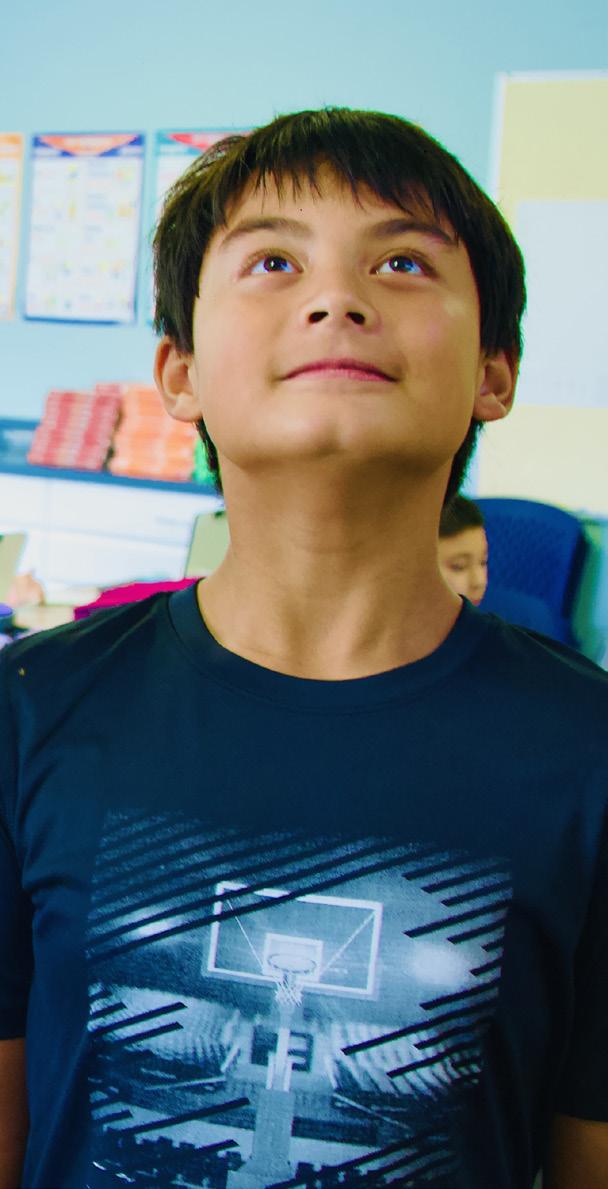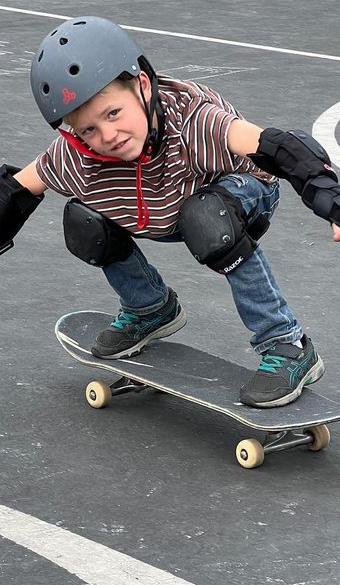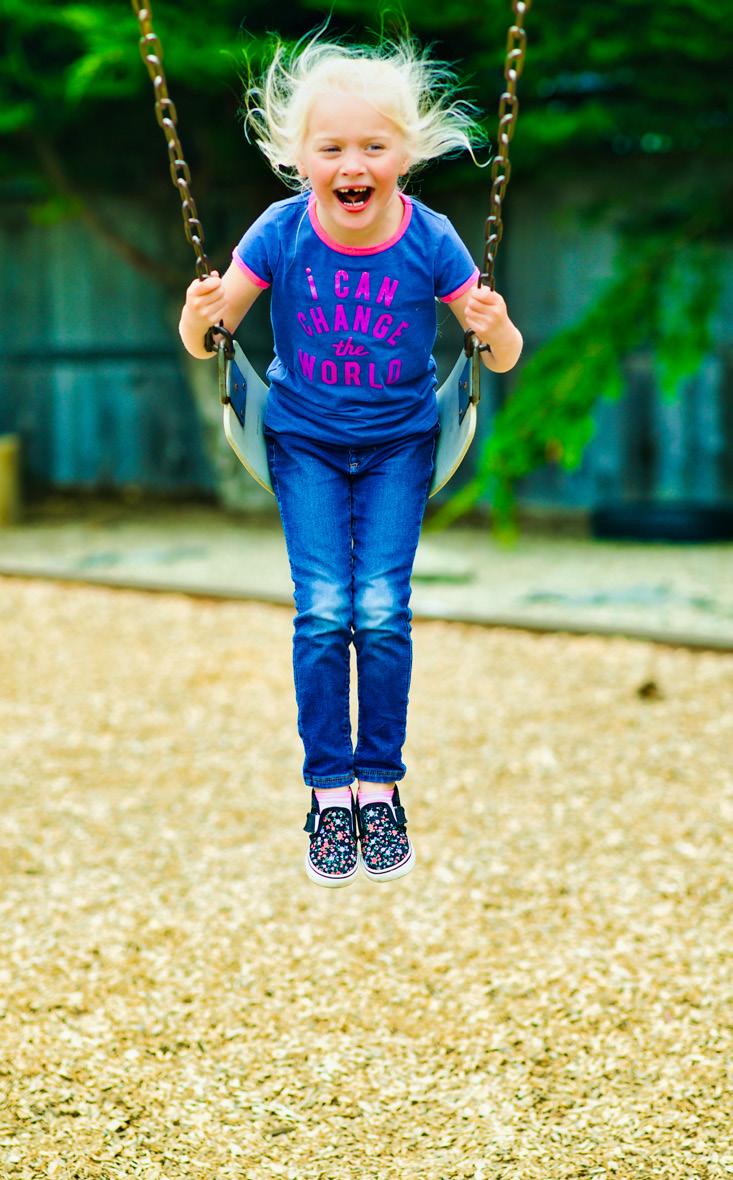AnnuAl RepoRt 2022-23
Students at the Center



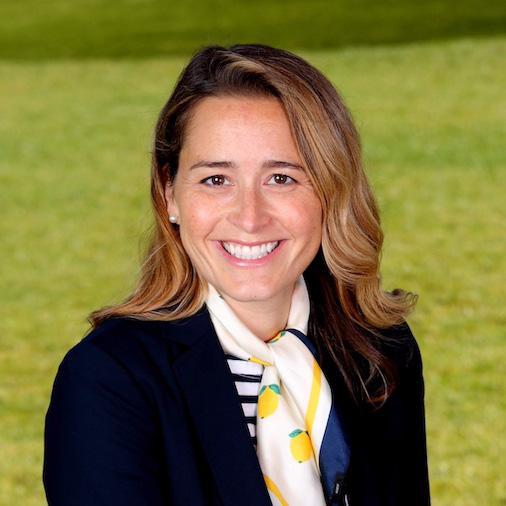
The 2022-2023 school year brought us a year of continued enrollment and development growth, a chance to pause and reflect on who we are as a school and the opportunity to connect and celebrate as a community. Sea Crest School is entering the next chapter of its story. 27 years ago, the school was founded on the belief that providing an independent school option on the coast that is rooted in the values of leaving it better than we found it, could and would inspire learners to go out and become change makers in their communities.
The last few years, our school dug deep and weathered the uncertain times of Covid and has emerged stronger than ever. I am honored to be part of a school that sees each student as a unique individual, capable of reaching their full academic potential, comfortable and brave enough to get on stage, understanding of the importance of service to others, vulnerable in their relationships with their peers and teachers and dedicated to being a collaborative part of this community.
My family and I moved here three years ago in the middle of the shutdown, excited by the idea of a place that values the coastal lifestyle and the belief that childhood is a gift. As parents we have seen the awesome power of Sea Crest in full force. When the board asked me to consider if I would continue my leadership for the next decade of the school’s journey, it was a prospect that excited and empowered me. What would it mean to start to look at my decision making for the present and the future, knowing that I would be part of the future? What goals can the board and I accomplish knowing we have the gift of time? How exciting to work on our strategic plan with the knowledge I will be here to see that it fulfills its potential?

This year, as a community, we will have the opportunity to answer these questions through our accreditation and next strategic plan.
The CAIS (California Association of Independent School) accreditation is an opportunity for the school to audit where we are in all aspects of the school. The accreditation process allows us to show that we meet requirements in institutional purpose and core values, teaching and learning, financial sustainability, operational purpose and core values, institutional stewardship and leadership, as well as institutional improvement and sustainability. It also allows us to document how we achieve high standards and engage in community wide reflection about self-improvement. You can read more about the efforts we have been making with the faculty and staff around curricular alignment and our scope and sequence in the program pages on this report.
We have made it to our halfway point in our strategic planning process. Under the guidance of Leadership and Design, the strategic plan committee has crowd-sourced and come up with four areas of inquiry for the community to give input on at our community design day this fall. These areas of inquiry will then be turned into focused goals that will be approved and shared out in the new year. The next strategic plan is to serve as the compass for the next chapter of our school and we want to make sure that it is reflected in the community it serves so please save the date for our community design day.
We have just closed the chapter on a big year and are excited to lay the foundation for the future. None of the work that you see throughout this report could have been done without a faculty and staff that deeply care about the profession of education and know and love our kids. Each and every day they put our students at the center and the following report celebrates just that.
Thank you for sharing your child with us and for being part of the Sea Crest community.
 Lauren Miller Head of School
Lauren Miller Head of School
As summer comes to an end and the new school year approaches, I would like to send a warm welcome to all our new families and to all our returning students, families, teachers and staff. I hope this letter finds you in good health and eager to begin the journey into the 2023-2024 school year.
First off, on behalf of the Board of Trustees, I am thrilled to announce that Head Of School, Lauren Miller, has signed a 10 year contract with Sea Crest. We are so excited for Ms Miller to continue to build on the growth of the past three years. Under Lauren’s leadership, Lauren and her team have grown our enrollment to its highest numbers in Sea Crest’s 27 year history, increased financial stability, created a Scholars Program, retained and supported the growth of teachers and staff, created a Marine Science lab and program, enhanced the entire JK-8 academic program, built The Reef and a new library just to name a few incredible endeavors. Ms Miller’s compassion, love and dedication to Sea Crest, the Half Moon Bay community, students and families has truly made a massive impact and we can’t wait to see what the next 10 years brings!

Secondly, we have school beginning in just a couple weeks! We have some exciting things happening this year that align with our Board of Trustees’ multi year goals: CAIS Accreditation (March of 2024), a Strategic Plan (Board approval in late January), a Board of Trustees Succession Plan, and a Long Term Facilities Plan. Look for more information on all the above in the Sunday Waves throughout the year.

Because of the unwavering support and involvement of our parents and families, your active participation strengthens the bond of our school community. From classroom volunteering to attending school events, your contributions are truly invaluable. Please save the date Saturday, September 23rd from 9AM-3PM for our Community Day in the Reef, where you will have the opportunity to voice your thoughts and hopes on what our multi year strategic plan will look like.
Lastly, one of the key messages I’d like to emphasize this year is the importance of not sweating the small stuff. This summer, my younger brother got married by the sea in Crete witnessed by a small group of friends and family. We created memories, we laughed, we cried and we took a moment to pause. As Joe, Maia and I sat on the plane to embark on the long journey home, we all thought the same thing: they do it right in Greece! There was a sense of calmness. We ate as a family every night. We walked after dinner. We didn’t rush. Although not everything went as planned, we chose to focus on the blessings and not to sweat the small stuff. I encourage us all to try not to get caught up in the hustle and bustle and lose sight of the bigger picture and to keep in mind that the journey is just as important as the destination.
Wishing you all a fantastic year!
 Karin Manuele Board of Trustees Chair
Karin Manuele Board of Trustees Chair
I’m pleased to report that through increased enrollment, generous donations, and mindful spending, Sea Crest experienced another financially strong year in 2022-23. The School achieved both its revenue and expense targets while continuing to invest in facilities, build upon academic programs, and attract and retain exceptional faculty.
Enrollment climbed for the third year in a row, reaching a total of 287 students during the school year. We welcomed 64 new students to our community, representing 22% of our student body. This uptick in enrollment contributed to a net tuition revenue increase of $0.8M or 16% from prior year. Gross tuition revenue was offset by $1.0M in flexible tuition awards and $0.3M in remission which together made the Sea Crest experience affordable for 28% of our families.
Revenue from auxiliary programs grew $0.3M or 113% from prior year reflecting increased demand for both our extended day program (EDP) and summer camp.
Sea Crest once again received generous support from our community during the 2022-23 school year. Unrestricted fundraising efforts exceeded expectations with $0.3M received for the School’s Annual Fund campaign. Restricted contributions were also strong with $113K raised for the art studio project, $41K for the Ginger Girven Run to fund flexible tuition, and $32K for the Sea Crest Scholars program.
Operating expenses increased $1.0M or 19% from prior year, largely driven by the School’s largest expense line item, salaries and benefits, which increased $0.5M from prior year. Auxiliary program expenses increased $0.2M to support expansion of the EDP and summer camp programs, in-line with the related increase in revenue. Academic programs increased $0.2M due to enhanced curriculum and field trips.

The School invested in several student-centered capital projects last year including the Reef, the library and tree house, and classroom remodels for all Primary and Secondary grades (JK – 4th). A JK playground was also installed to better support the safety and developmental needs of our youngest students.
Sea Crest’s financial strength is imperative to ensure the long-term sustainability of our School and relies heavily on continuous support from our community. Please accept my deepest gratitude for your active engagement and generous contributions which made it possible for Sea Crest to deliver the high-quality program you have come to expect.
Thank you, thank you, thank you!
Jacquie Cuvelier Chief Financial Officer


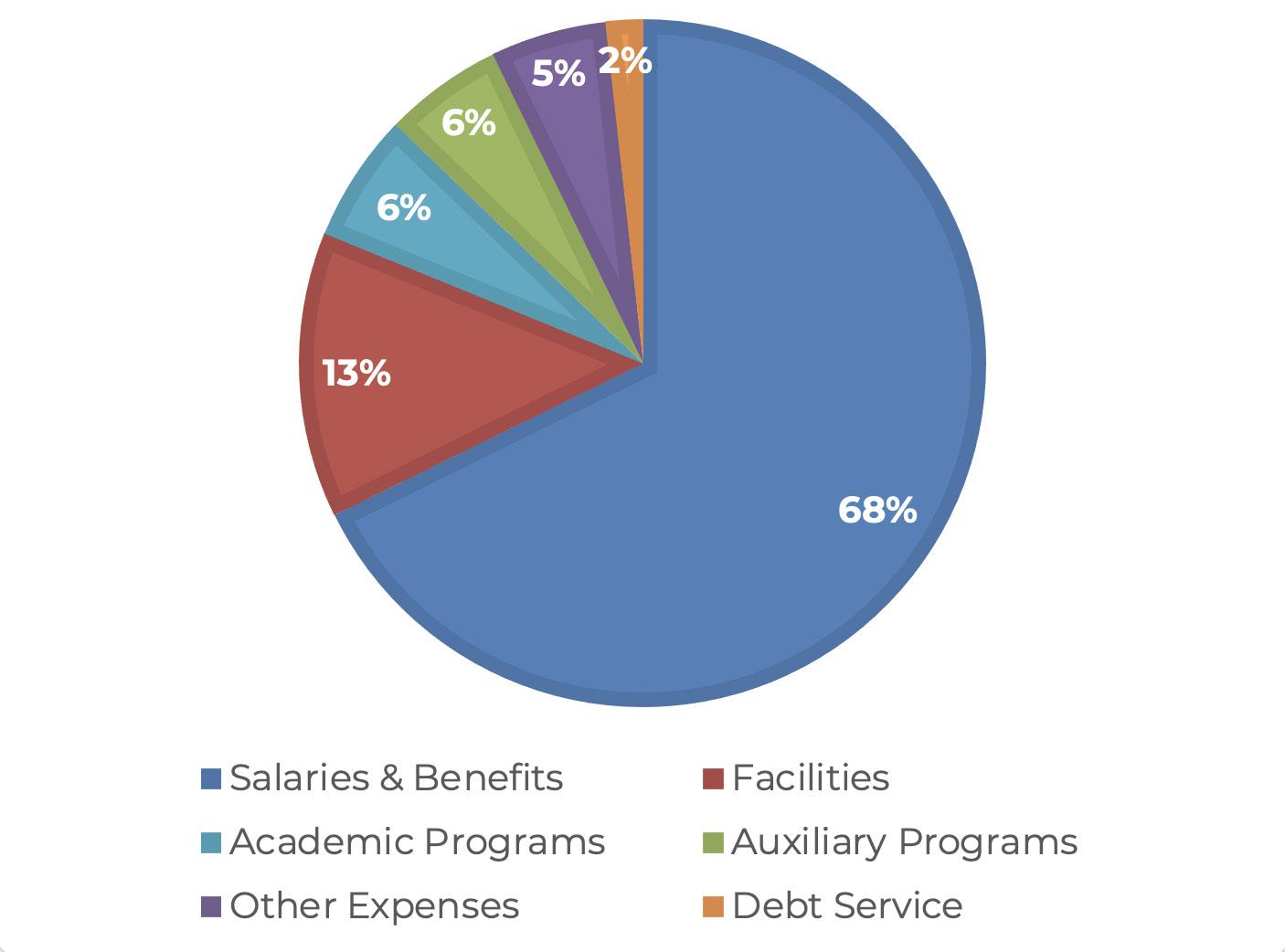
100% BOARD PARTICIPATION

100% FACULTY PARTICIPATION
97% FAMILY PARTICIPATION
The 2022-23 Annual Fund succeeded in hitting the school’s goals thanks to the incredible generosity of our community. As our most critical and important fundraiser of the year, the Annual Fund goes into an unrestricted account to support the people, program, and campus that make Sea Crest thrive.

The Annual Fund supports our teachers through ongoing professional development and curriculum training. Funds provide an opportunity for the school to offer health and wellness stipends and educational grants.

The Annual Fund continues to provide engaging academics and enrichment opportunities on and off campus for all of our students.
The Annual Fund allows our school to continually invest in our campus to be an inspiring, studentscentered, and safe space for students to learn and grow.
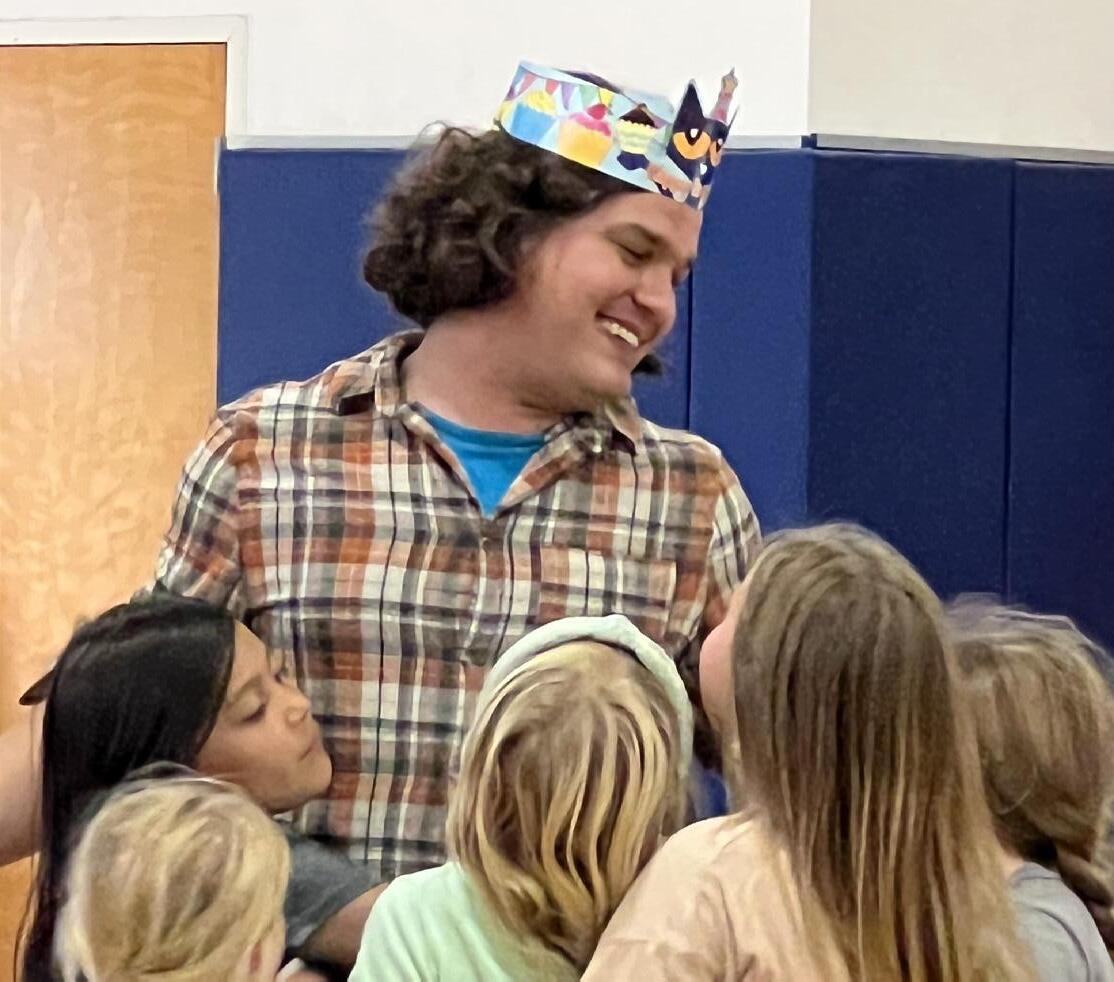
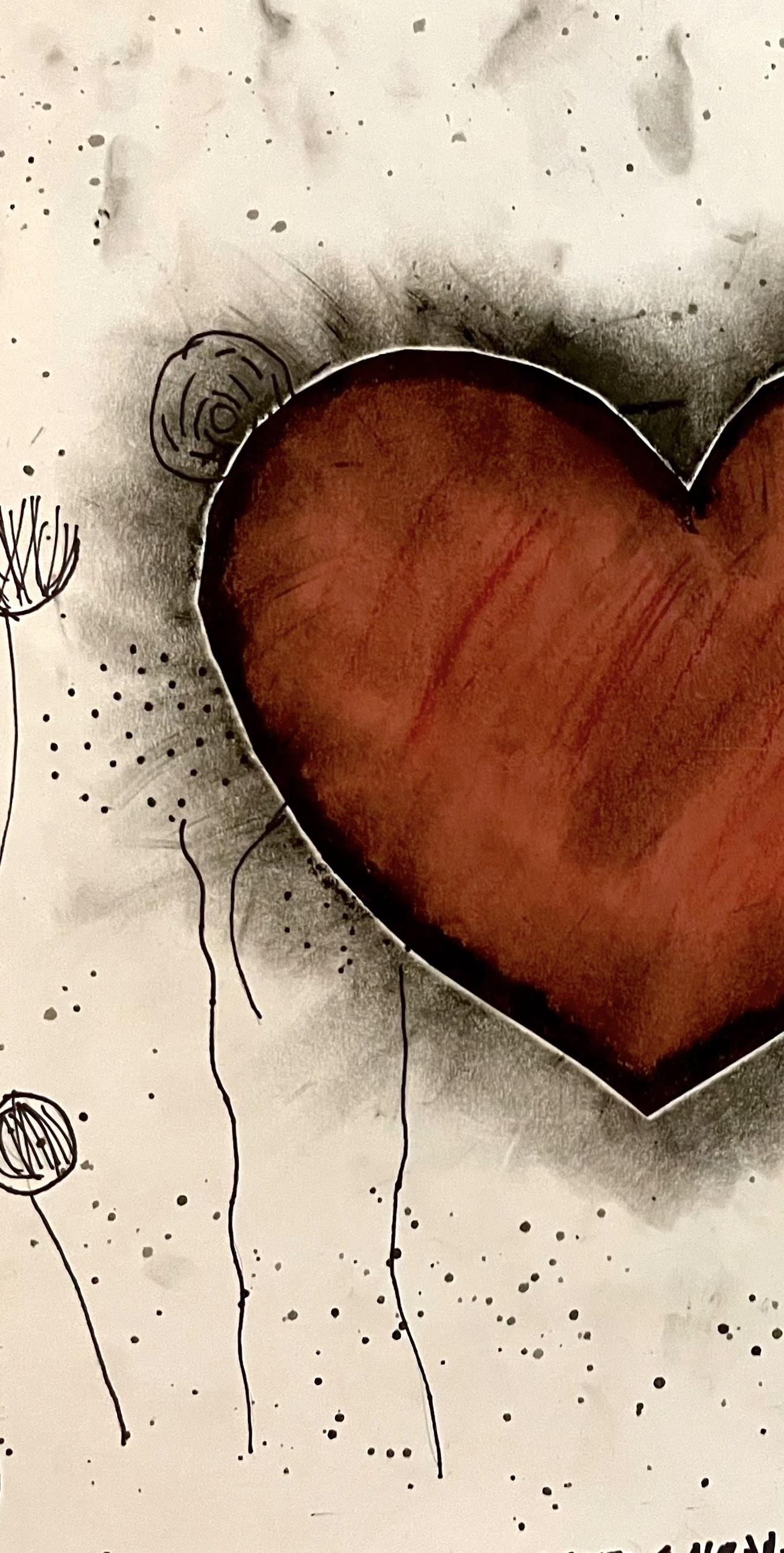
Since 2021
We know that our future leaders come from a broad range of backgrounds and cultures and that they should be provided with the outstanding foundation an independent school can provide.

Our full-ride scholarships provide talented but economically disadvantaged and culturally underrepresented upper school students (grades 5-8) from our Half Moon Bay community with access to an outstanding education while enriching our classrooms and broader community.
We could not be prouder of the support we have received for this program over the last two years. This school year, we are welcoming
5 Sea Crest Scholars!
Since 2000
Each year, students come together and run to raise funds for Flexible Tuition at Sea Crest School. This program makes our school more accessible to families on the coast.


This fundraising run honors one of our founding teachers, Ginger Girvin. The theme of the Run is “All for One, Run for All!”
+
We raised $41K for Flexible Tuition
Your Impact




In Spring 2022
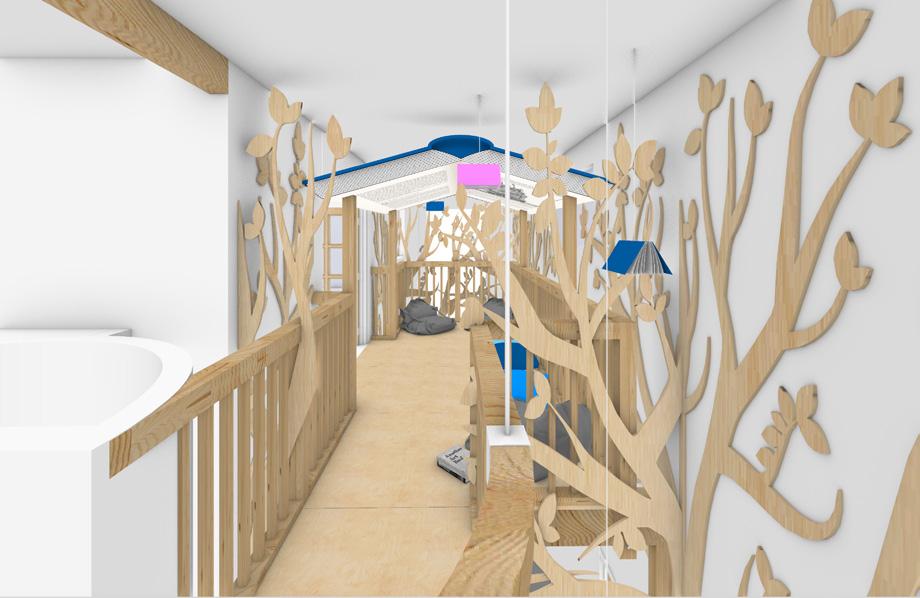


In Spring 2023
we envisioned a dynamic and engaging art space that focuses on the needs of our students, embodies our desired program outcomes, and serves as a source of inspiration for generations to come. Coming
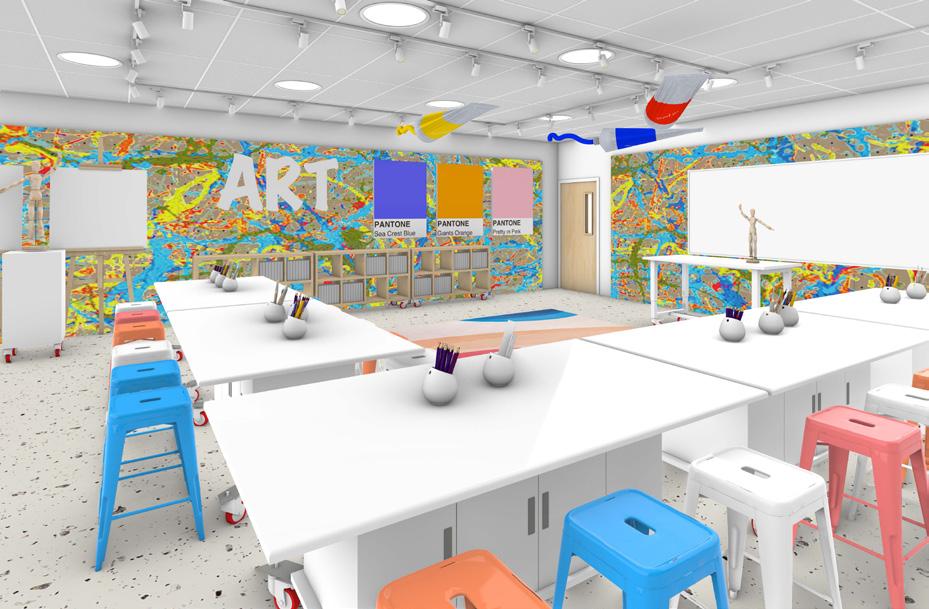
JK-8 Art Studio
Together, we raised $113 K
Save

In Spring 2024
YOU
The Raise The Paddle will take place at The
Event
Friday, March 15th, 2024
A magical evening when dreams can come true
Sea Crest is a JK-8 school of joyful learning and community. Located in the heart of Half Moon Bay, Sea Crest offers a high-quality, engaging educational experience that leverages our beautiful setting with a focus on marine and coastal connection. Our creative and collaborative educators believe in providing the best in innovative education to inspire and empower learners to engage curiosity, express creativity, act with compassion, and lead with courage.
For 27 years, we have had the privilege of stewarding young minds and hearts through their journey of discovery, growth, and development. Our small class sizes support a personalized approach to instruction and the opportunity to develop strong connections with students. Our enrichment programs enable students to discover new interests and abilities in a supportive environment.
Sea Crest School is dedicated to providing the best in innovative education to inspire and empower our learners to engage curiosity, express creativity, act with compassion and lead with courage.


The following 5 traits represent the defining characteristics of a Sea Crest graduate, and embody the qualities that we work towards every single day.
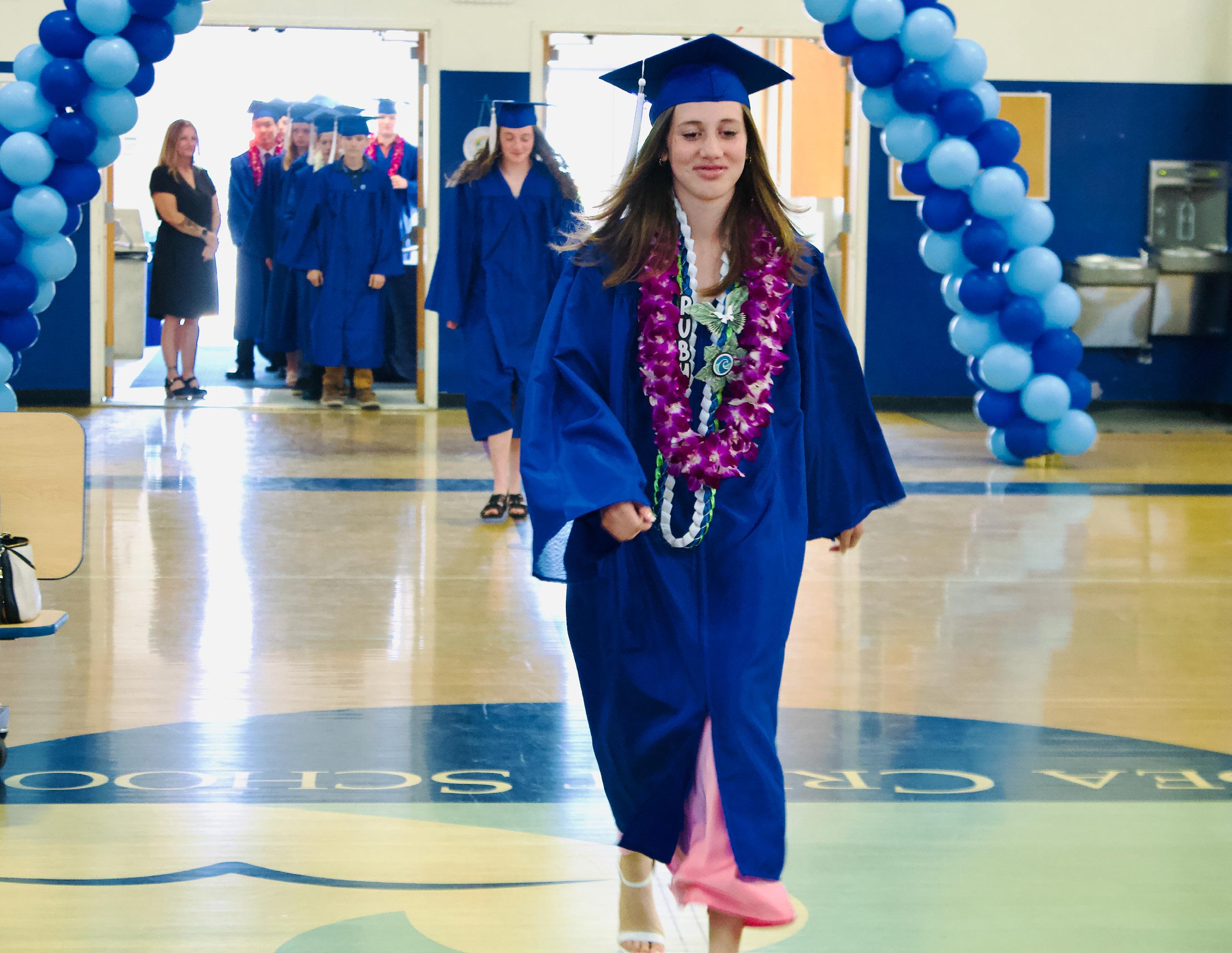
Re-written by Sea Crest Faculty 2021.
A Sea Crest student is creative when they purposefully use their imagination to expand and extend learning with their original ideas.
A Sea Crest student is inclusive when they “actively” welcome and involve others in conversations, collaboration, and activities.
A Sea Crest student is thoughtful when they are are present and engaged, putting their best effort forward.
A Sea Crest student is knowledgeable when they apply learnings to new contexts and effectively access resources available to them.
A Sea Crest student is articulate when they can clearly, succinctly, and effectively communicate their thoughts, ideas and feelings to others.
229 STUDENTS 2020-21
537 TOTAL 8TH GRADE GRADUATES SINCE 1996 WHO HAVE ATTENDED
50+ HIGH SCHOOLS
60+ COLLEGES UNIVERSITIES
265 STUDENTS 2021-22
287 STUDENTS 2022-23
28% STUDENTS PARTICIPATE IN FLEXIBLE TUITION PROGRAM
30% STUDENTS SELF-IDENTIFY AS STUDENTS OF COLOR
5 UPPER SCHOOL SCHOLARS SINCE THE PROGRAM WAS FOUNDED IN 2021
OVER $1M FLEXIBLE TUITION BUDGET
300 STUDENTS 2023-24
6:1 STUDENT TO FACULTY RATIO
50 FACULTY & STAFF
46% FACULTY WITH ADVANCED DEGREES
5 OVERNIGHT FIELD EXPERIENCES
15 SPORTS
50+ FIELD TRIPS
40 ROOM PARENTS
12 PARENT ASSOCIATION BOARD (PAB) EXECUTIVE COMMITTEE MEMBERS
4K VOLUNTEER HOURS 2022-23


The DEB committee is composed of trustees, teachers, administrators, parents, and community members. The goal of the committee is to prepare appropriate recommendations to the Strategic Planning Committee and the Sea Crest Board of Trustees that are aligned with the school’s Mission Statement and Values. The DEB committee uses the DEB decision making lens and School Statement of Cultural Competency as its guiding principles.
Sea Crest is committed to being a culturally responsive school that acknowledges and celebrates the rich diversity within our community. Through ongoing reflection of our institution, programs and teaching we strive to create a just, equitable and inclusive environment. The foundations of understanding, respect and communication are deeply embraced as part of the mission and guiding principles. We will continue to uphold these tenets to guide our actions and better serve and represent the broader community.

As we embark on a year of deep reflection and growth through the accreditation and strategic planning process, it seemed apt that we begin with a look at the heart of our program, our educational philosophy and curriculum. Over the past year faculty have collaborated to reflect, review, and re-envision our program as we “build back better” from the educational disruptions of COVID.
We examined core skill progressions and learning goals for students across their JK-8th grade journey and integrated new resources to support greater differentiation and ensure each student is appropriately challenged.
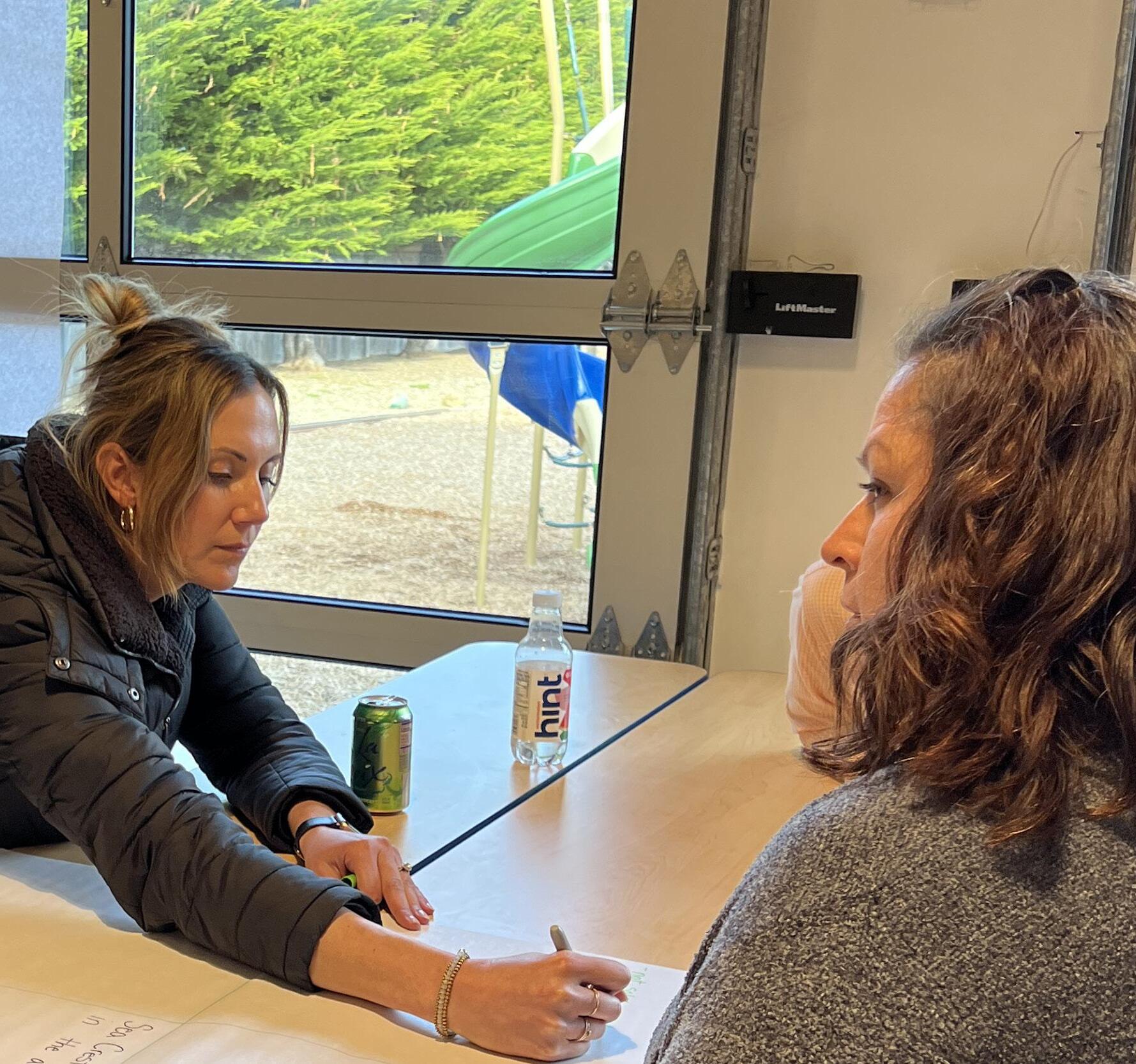

We have updated our Mathematics, Science, and Social-Emotional Learning curriculum, integrating a new and unique Marine and Coastal Science program, and brought back our formal band program in the 5th-6th grades. New divisions in Primary (JK-1), Secondary (2-4), and Upper School (5-8), as well as the shift to a new semester system were implemented to help recenter our focus on the developmental needs of students and greater alignment in teaching and assessment practices across the school year.

As an extension of this work, we are developing a comprehensive curriculum guide that will capture the JK-8th learning experience and serve as a guidepost for curriculum articulation, review, and planning. Read on for some programmatic highlights of this work at each grade level.



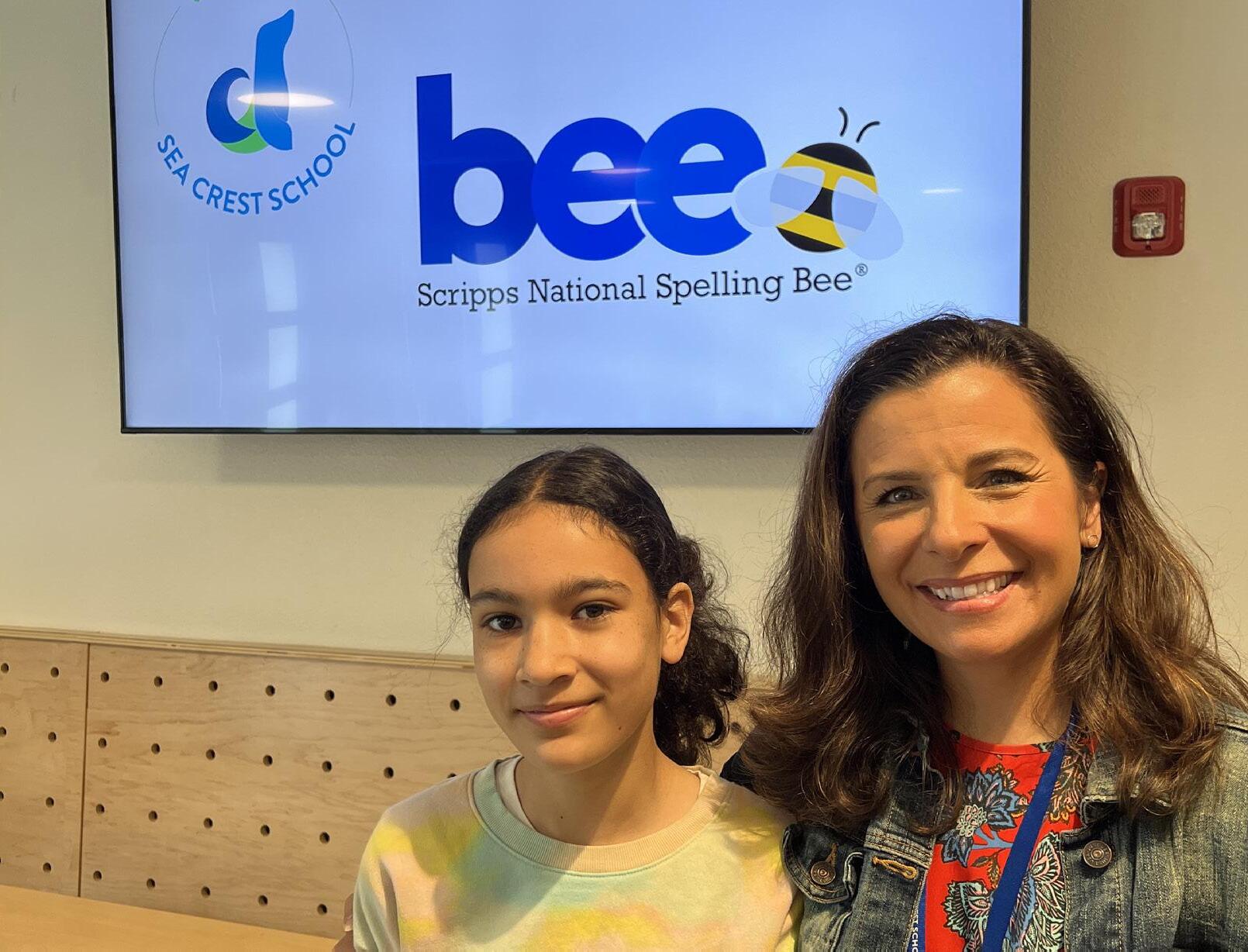
This year, we are also excited to take a comprehensive look at updating our Language Arts program by examining the best science-based practices in literacy instruction, ways to foster critical thinking and effective communication, and the new skills and competencies students will need to navigate the changing ways we engage with stories and information.
Michelle Giacotto Director of CurriculumWe believe that a Language Arts program should focus on building a strong foundation in literacy skills, while also nurturing a lifelong love of reading and a deep appreciation for the writer’s craft. Utilizing a workshop model of instruction, our teachers tailor lessons to meet the needs of their students and ensure that each is appropriately challenged. In Reading, teachers provide targeted instruction in decoding and comprehension strategies utilizing authentic texts at the student’s individual reading level. As students become more independent readers, the focus shifts to deepening reading comprehension skills, vocabulary development, research skills, critical thinking, and literary analysis. In Writing, teachers place an emphasis on the writing process while integrating formal instruction in conventions and grammar across a variety of writing formats and structures. Students learn to view writing as a vehicle for communicating their thoughts, feelings, stories, and ideas, and work to do so with ever-increasing clarity, organization, and purpose.
We believe that Mathematics instruction is most meaningful and memorable for students when it is rooted in opportunities for authentic problemsolving, mathematical discourse, and real-world application. Our curriculum focuses on developing in students a deep understanding of math concepts, proficiency with key skills, and the ability to solve new and complex problems. Students are invited to talk about math, describe observations, explain methods, and ask questions. They are encouraged to find multiple ways to solve problems and record their thinking in order to ultimately determine the most efficient and effective

strategies to solve problems. Instruction is scaffolded to provide students with an appropriate level of learning challenge and pace, which is formalized into different mathematical pathways in the Upper School. Students are encouraged to see themselves as mathematicians and to develop strong work habits and an effective toolbox of problem solving skills and strategies that they can apply with ever increasing independence.

We believe that Social Studies learning should encompass learning about ourselves and others, our place in the world, as well as our place in time, to empower students with the knowledge and skills to be thoughtful and contributing members of their community. Social Studies units are designed to offer students a better understanding of their own experience, insights and perspectives about the experience of others, what it means to be part of a community, a look at the continuity and changes of civilizations and cultures over time, and the rights and responsibilities of citizenship.
We believe that a Science program should be rooted in opportunities for authentic inquiry and build upon students’ natural curiosity about the world around them. Our teachers model and encourage students to cultivate a curious mindset as the cornerstone for lifelong learning. Scientific inquiries are designed to offer students opportunities to carefully observe, explore, investigate, and question natural phenomena in order to develop an understanding of crosscutting scientific concepts (such as patterns, systems, proportion, cause & effect, structure & function, energy & matter, and stability & change) across the Physical, Earth, and Life domains. Learning is made more relevant and meaningful as students continue to examine these concepts in the context of our local coastal and marine environments.
We believe that students’ social emotional development is just as important to their education and future success as their academic development. Our teachers utilize a Responsive Classroom approach to build a strong sense of collaboration and community in the classroom.
Students work with teachers at the start of the school year to collaboratively set goals and guidelines for how they will learn, grow, and work together throughout the year to come. Students explore core Social-Emotional Learning skills and strategies as part of their Morning Meetings and core classroom work in Primary and Secondary, and through the Advisory program in Upper School. Each year, they build and expand upon the tools and strategies introduced to meet the ever-evolving developmental, social, and cognitive needs of students.
The curriculum focuses on providing students with tools and strategies to further character development and key SEL competencies (self-awareness, selfmanagement, social awareness, relationship skills, and responsible decisionmaking). Students explore one character trait per month that connects to three overarching student outcomes: Be Kind (Social Skills), Be Strong (executive functioning), and Be Well (emotional regulation).
We believe that Enrichment programs are a vital part of a well-rounded education and a key component of the Sea Crest learning experience. Opportunities for students to explore subjects such as Physical Education, Visual Arts, Spanish, Music, Makerspace, Theatre Arts, and Technology, help students to foster creativity, cultivate new skills, discover personal talents and
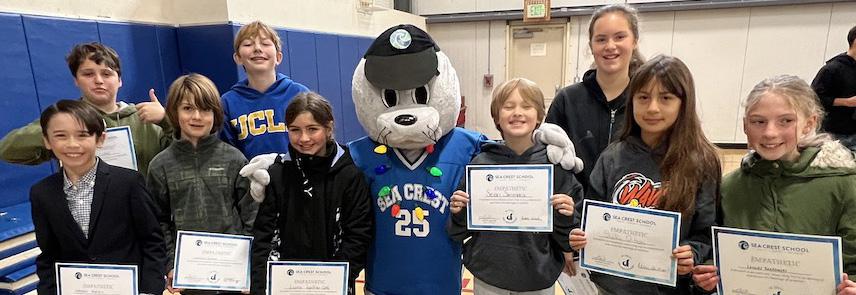
affinities, and develop a deeper understanding and appreciation of the breadth of human experience. We believe that introducing students to these subjects from a young age has a lifelong positive impact on their learning and understanding of themselves and others.

We believe that learning is more meaningful and memorable when students engage in purpose-driven, real-world experiences where they are empowered to have ownership in the learning process. Project Based Learning is designed to teach students the academic knowledge and skills they need to learn in an authentic context that also nurtures critical thinking, creativity, collaboration, and communication skills. Through inquiry and exploration, students collaboratively investigate a complex question, problem, or challenge, then create a public presentation or product to share their learning with others. A project-based approach brings a sense of creative energy to the classroom that inspires joyful learning.
We believe in Experiential Learning, the concept of “learning by doing”. Throughout their JK-8th journey, students engage in hands-on experiences that help to connect their learning to the world beyond the classroom. From exploring tidepools or local farms to snorkeling in a kelp forest off the Catalina coast, learning is grounded in authentic experiences that help students to make connections to the world around them.
We believe that Environmental Stewardship (the responsible use and protection of the natural environment through conservation and sustainable practices) is a critical competency that will play an increasingly important role in the future of our students. Environmental education fosters a sense of responsibility and empowers students to make informed choices that contribute to a more sustainable future. Through environmental education, students also develop a deeper connection and appreciation for the natural world. Regular opportunities for marine and coastal science education, field studies, connections with local environmental experts and advocacy organizations, and service-learning projects create an authentic context for fostering environmental stewardship in our students.
Each month, the entire JK-8th school community gathers in the gym for an All-School Assembly. Assemblies offer an important opportunity for students to build community across the grade levels, cultivate school spirit, and share some of the exciting learning taking place in their classrooms. Each month a group of students from each division are honored at the assembly as “Super Seals” for exemplifying the previous month’s character trait of focus. Families are always invited to assemblies to join in the celebration.

Each year, students are partnered together with a cross-grade level “Learning Buddy”. Learning Buddies offer a valuable chance for students to build friendships across divisions and for older buddies to serve as a mentor to their younger partners. In addition to specially planned activities around holidays and school events, Learning Buddies meet each month to make connections, share about themselves and their learning, and explore our Character Education themes.

Musical
The annual spring musical is a time-honored tradition at Sea Crest that represents a tremendous collaboration between our performing and visual arts departments and students across the grade levels. Each May, students from JK-8th grade take the stage at our local Coastal Rep Theater for a week of exciting performances. Upper School students have the opportunity to audition for lead roles, play instruments as

part of the musical accompaniment, or get involved backstage as part of the set design team or backstage crew.
Primary and Secondary students all rehearse musical numbers and join our Upper School leads to perform as part of the ensemble. Students gain firsthand knowledge of what it takes to collaborate as part of a successful performance and a deeper appreciation for the theater arts.
Sea Crest is not only a school, but a rich and vibrant extended community of students, faculty, and families. Throughout the year, the Sea Crest community gathers for special events and celebrations.
September- Family Spaghetti Dinner & Back-to-School Night

October- Pumpkin Festival Parade & Halloween Carnival
November- Stone Soup Lunch
December- Night of Lights & Holiday Concert and Grandparents’ Day Celebration
February- State of the School Event
March- Literacy and Book Fair Week, the DREAM Event, & Spring Concert
April- Coast Week & Community Beach Clean-up
May- Ginger Girvin Run & Spring Musical
June- Moving-up Ceremony, Talent Show, & End of Year Carnival
The Primary School program embraces a child’s natural sense of wonder to spark the joy and love of learning.
Students begin to build a strong foundation for literacy, number sense, and social-emotional development.
Our hands-on, experiential approach EXCITES students to explore, discover, learn, and grow.
Students make the magical connection between sounds and letters, letters and words, and words and stories. They discover that exciting new worlds can be opened through reading and learn to view themselves as writers with stories to share.

Instruction focuses on introducing mathematical practices and thinking routines to help students develop number sense as a strong foundation for future learning. Students engage in many opportunities for hands-on learning, where they can explore new concepts in a concrete way, building and modeling problems with manipulative tools.
Social Studies in Primary goes hand in hand with developing social skills and social awareness. Students learn about the immediate world around them, exploring the concepts of family, school community, neighborhoods, and how a community meets its needs, with an emphasis on celebrating diversity, collaboration, and interdependency.
Students apply their innate sense of curiosity to adopt a scientific lens as they utilize their five senses to become careful observers of the natural world. Through handson investigations into air, weather, sound, light, ocean habitats, natural materials, and how living things grow and change, students gain a deeper understanding of and appreciation for natural phenomena.
Primary enrichment classes offer students an engaging introduction into the performing and visual arts, making, physical education, and Spanish. Students explore the connection between music, movement, and storytelling in the performing arts. They engage in songs and games that introduce the concepts of rhythm, beat, call & response, as well as basic movement and dance.
In Jr. Makers class, the students have the opportunity to build and tinker in the iLab while exploring STEAM concepts in hands-on applications. Students visit the Art Studio to work with a variety of tools and mediums to explore color, line, shape, and form, as well as the creative process.
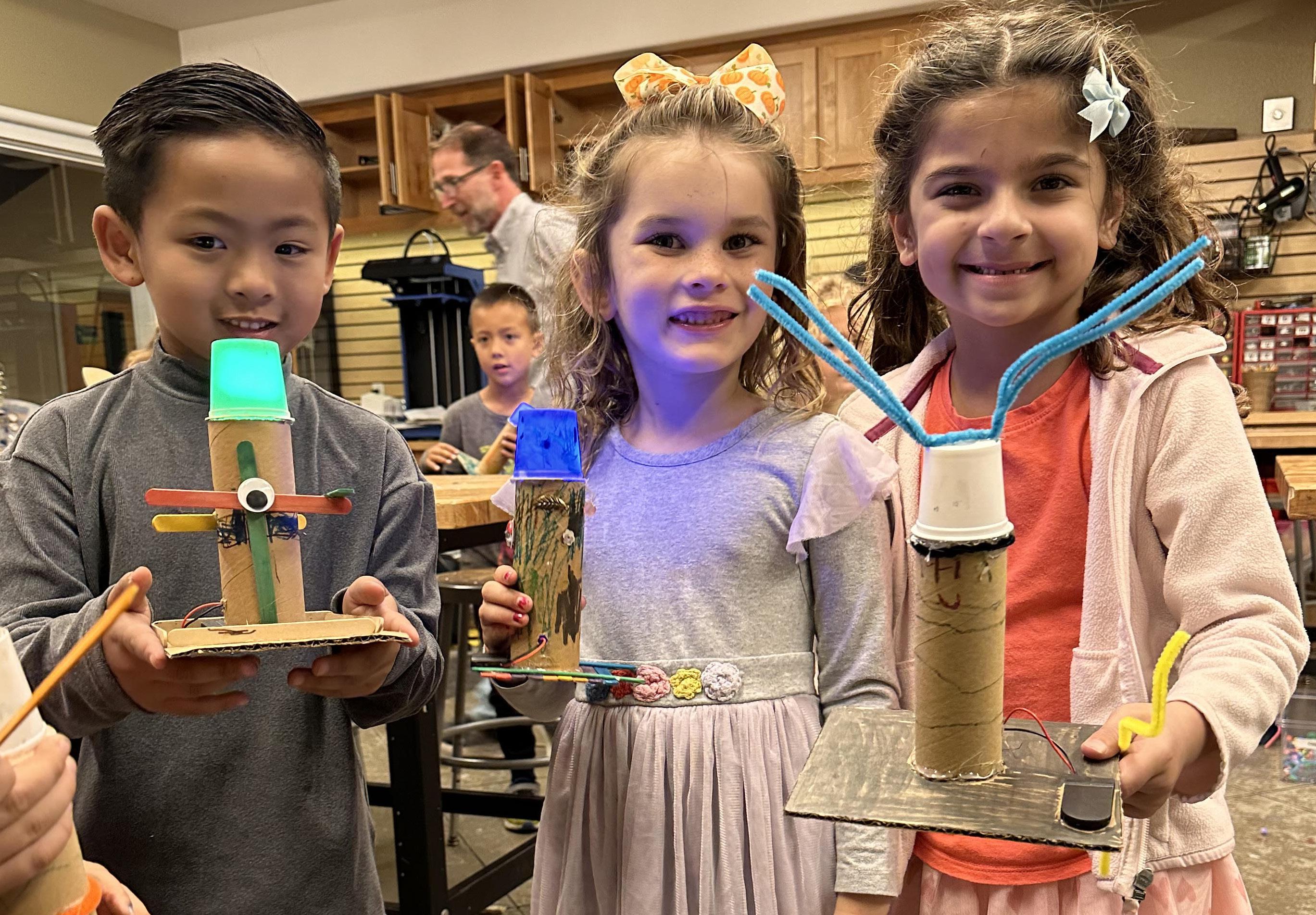
Physical education classes promote the importance of a healthy, active lifestyle. Activities develop balance, cross-motor coordination, strength, and cardiovascular health, while introducing basic skills (throwing, catching, skipping, hopping, stretching, etc.) and teamwork.
Students also participate in weekly Spanish classes that provide an introduction to everyday vocabulary and common phrases through the use of stories, games, and fun activities.
Students explore character traits that connect to three overarching student outcomes: Be Kind (Social Skills), Be Strong (executive functioning), and Be Well (emotional regulation).
Junior Kindergarten + Kindergarten
Be Kind: Listening
Be Strong: Following Directions
Be Well: Identifying Emotions
First Grade
Be Kind: Friendship
Be Strong: Focusing
Be Well: Emotion Awareness
Students study the life cycle of a frog. They journey to our local bluffs to collect tadpoles and create a classroom habitat to observe the tadpoles during their metamorphosis into frogs. As young Herpetologists, they take note of the conditions needed for frogs to spawn and the role that rainfall and wetlands play in that process.
Students conduct an annual egg-to-trout lifecycle study, observing this magical transformation firsthand in classroom aquariums before releasing them into their native environment.
Students learn about our local Half Moon Bay community and early city planning in their neighborhood study, which culminates in the creation of a model city in the innovation lab.
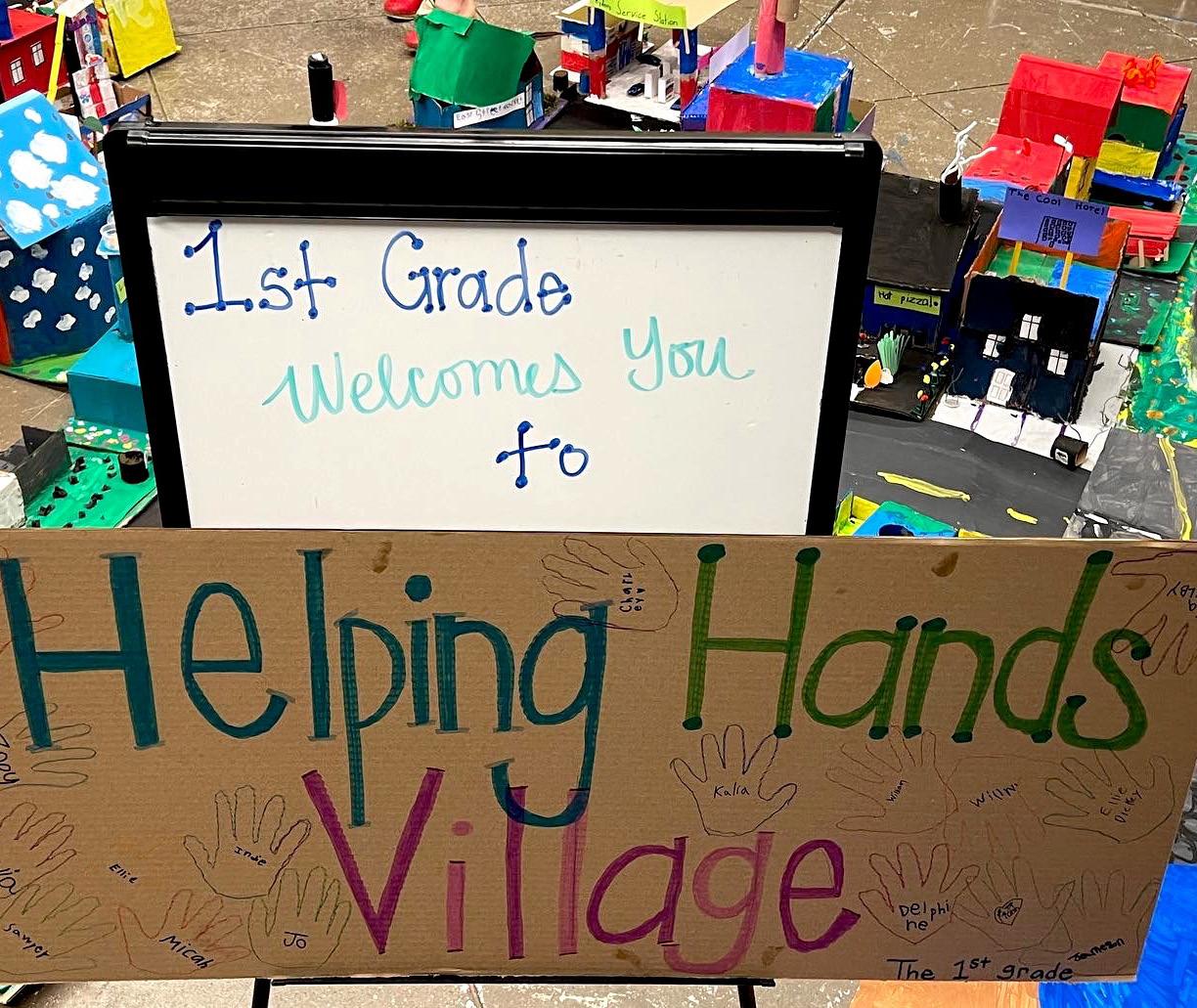

Junior Kindergartners engage in a close study of trees, observing how they grow and change across seasons. Students learn the important role trees play in their everyday lives and the value of caring for and planting new trees, as well as reducing our paper use and waste.
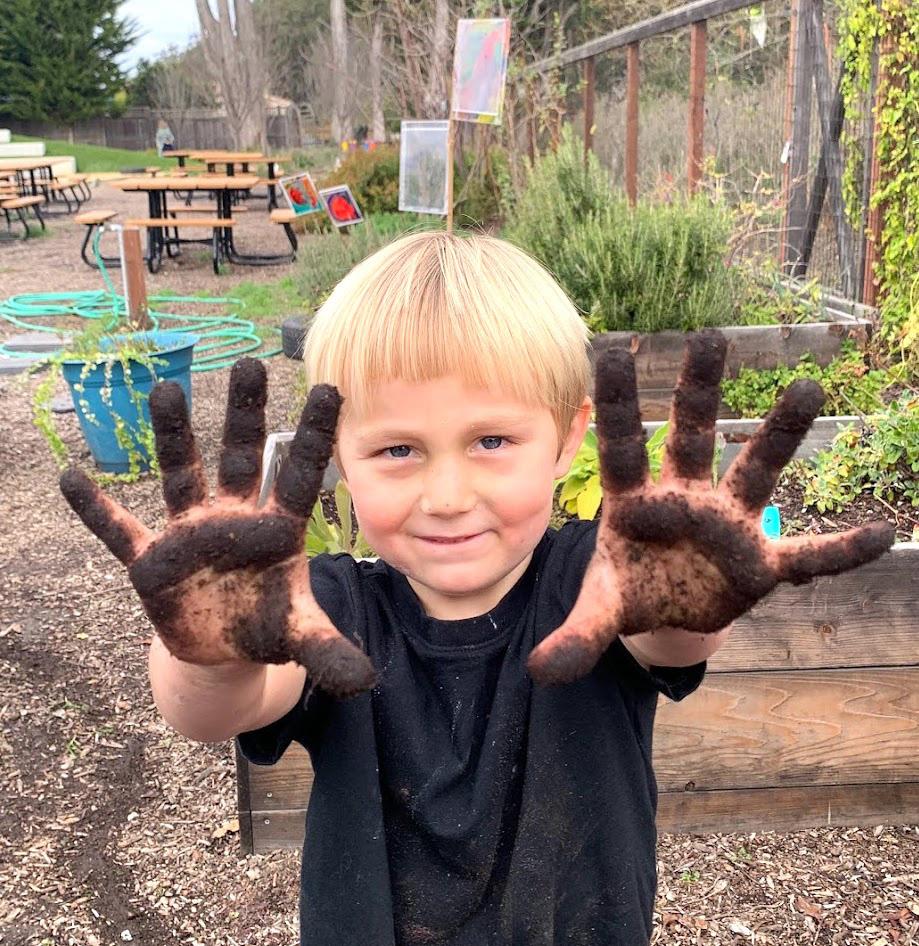
Kindergarten students will be engaging in a new study this year to investigate food waste and how we can reduce waste in our homes and school community. Students will investigate the benefits of composting and develop effective composting habits to share with their families and fellow students.


First graders explore the seed to table journey as part of their Farms & Farmers’ Markets study. They visit several local farms to learn about the benefits of sustainable farming practices and organic produce. They work with the HEAL Project, a local non-profit organization, to engage in hands-on activities that help illustrate farm-based food systems and reinforce the connections between food, health, and the environment.
The Secondary School program develops strong academic skills and lifelong learning through a project-based, workshop model of instruction.
Students grow in self-awareness and independence while learning to be supportive classmates, caring friends and active members of the community.
Our dynamic curriculum ENRICHES students by offering the chance to discover new interests and explore cross-curricular opportunities for creative self-expression.

In the Secondary grades, students deepen their knowledge of literary genres and story elements while developing the skills and strategies to become effective and engaged readers and writers. Their learning experience is enriched through meaningful discussions in Book Clubs and writing conferences with teachers and peers. Students learn how organization, language conventions, and grammar play an important role in bringing meaning and clarity to their writing, and how to revise and edit their written work.
Students expand their repertoire of operations, building upon their understanding of addition and subtraction to master multiplication and division. Students explore place value to tackle increasingly complex problems and delve into the more abstract mathematical concept of “part to whole” through an introduction to fractions and decimals. Teachers encourage students to think mathematically and discover multiple approaches to solve a problem while differentiating to ensure students are appropriately challenged.
Students expand their lens to explore our broader global community and to learn about the history of our local community and state, making comparisons between life then and today. Students also learn to look at social studies through the lens of perspective, understanding how events impacted different groups of people.
Secondary students continue to observe and explore their world, while learning to apply the scientific method to experiment and make predictions. Students learn to carefully record their scientific observations and thinking to share with others. Through investigations into the Life, Physical, Earth, and Marine & Coastal sciences, students continue to deepen their understanding of the natural world and how things work.
Students in the Secondary grades further enrich their learning through specialist classes. In Music, they study musical notation and learn about composition. Through experiences with percussion instruments, recorders, and ukuleles, students learn about instrumentation and the wide variety of musical genres and styles that exist. In Theater Arts, students fine tune their public speaking skills and learn how to improvise and be part of an ensemble.
In Makers class, students learn about the design process and the importance of persistence and iteration as they work to solve real world design challenges. Students also learn to utilize technological tools for making, such as coding, graphic design, 3D printing, and laser cutters. In the Art Studio, students continue to explore visual arts concepts while beginning to view art tools and mediums as a means of self expression. Students learn about art history with an emphasis on exploring art forms, styles, and movements through the work of famous artists.
In Physical Education, students are introduced to a variety of games and sports with an emphasis on individual skill development, collaboration, and good sportsmanship. Spanish instruction expands to include more opportunities to read and write in the target language, as well as an introduction to basic grammar and an exploration of Spanish speaking countries and their cultural traditions.
Students explore character traits that connect to three overarching student outcomes: Be Kind (Social Skills), Be Strong (executive functioning), and Be Well (emotional regulation).

Second Grade
Be Kind: Understanding
Conflict Resolution
Be Strong: Engagement
Be Well: Emotion Regulation
Third Grade
Be Kind: Perspective Taking
Be Strong: Flexible Thinking
Be Well: Emotion Advocacy
Fourth Grade
Be Kind: Practicing
Conflict Resolution
Be Strong: Organization
Be Well: Positive Self-Talk
Second-grade students engage in a year long study of our planet Earth. They learn about geography with a look at the continents and oceans, as well as landforms and major ecosystems. Each student selects a country to research and become an expert on. Students create a report and interactive presentation about their country of choice that they share with the community at our annual World’s Fair event.
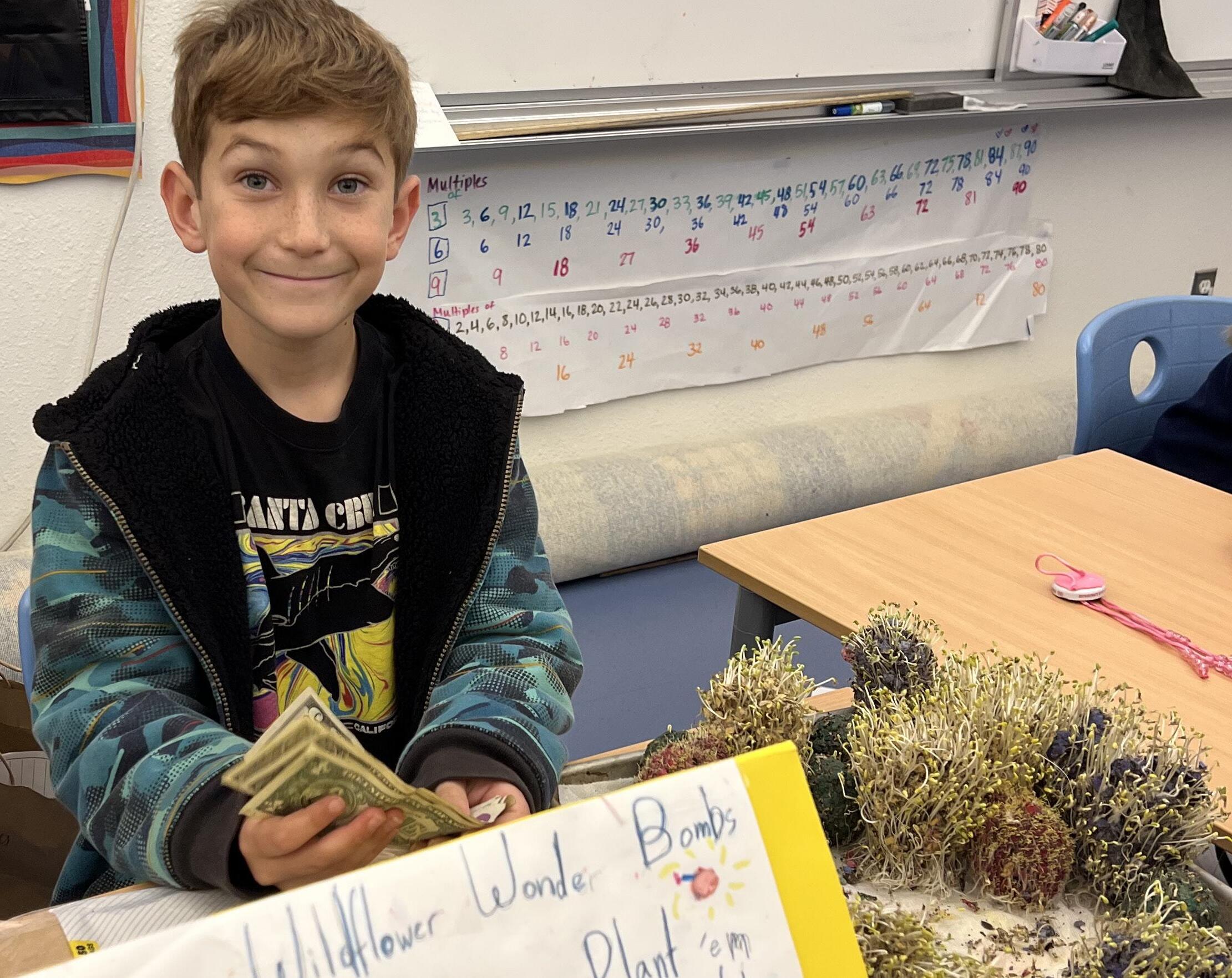

Third-grade students take a deep dive into the concept of reducing, recycling, and re-using our natural resources across the school year. They learn about the harmful impact of plastics in our environment. In spring, they interview local entrepreneurs and study the design process for innovation and invention. Students generate their own idea for a product that helps to reduce single use plastics in the environment. Students make prototypes of their product to display and sell at the Environmental Entrepreneur Fair in the spring.
Fourth-grade students step into the past to study California history through the lens of the native Californian tribes and the various groups of people who later migrated here.In spring, students journey to the foothills to camp along the Sacramento River and walk in the footsteps of history. They explore a former Nisenan village and investigate the banks of the river to gather and study plants that the Nisenan used for medicinal purposes. Students learn how the discovery of gold in California impacted human geography and about the hardships and challenges settlers encountered traveling west. They use the knowledge and experiences gained to teach others as part of a school assembly.
Second-grade students study native plants and the important role pollinator insects play in the plant life cycle. They identify local native plant species that attract pollinator insects and select some to plant on campus in a pollinator garden. Students create signage about the plants to transform the garden into a learning laboratory for other students.
Third-grade students investigate water and the water cycle with a close examination of the interactions between water and other earth materials, and how humans use water as a natural resource. Students build watershed models to help demonstrate these concepts and teach others about the importance of clean water for all living things and what humans can do to reduce pollution.
Fourth-grade students study California Ecology and the diverse array of habitats and wildlife across the state of California. Students examine the human impact on these environments, from pollution to wildfires and construction, and examine ways that we can protect California’s natural beauty for future generations.

The Upper School program challenges and supports student growth through a personalized approach to academic instruction and robust enrichment and extra-curriculars.
Students develop effective communication, self-advocacy, and critical thinking skills through engaging lessons, discussions, and collaborative projects.
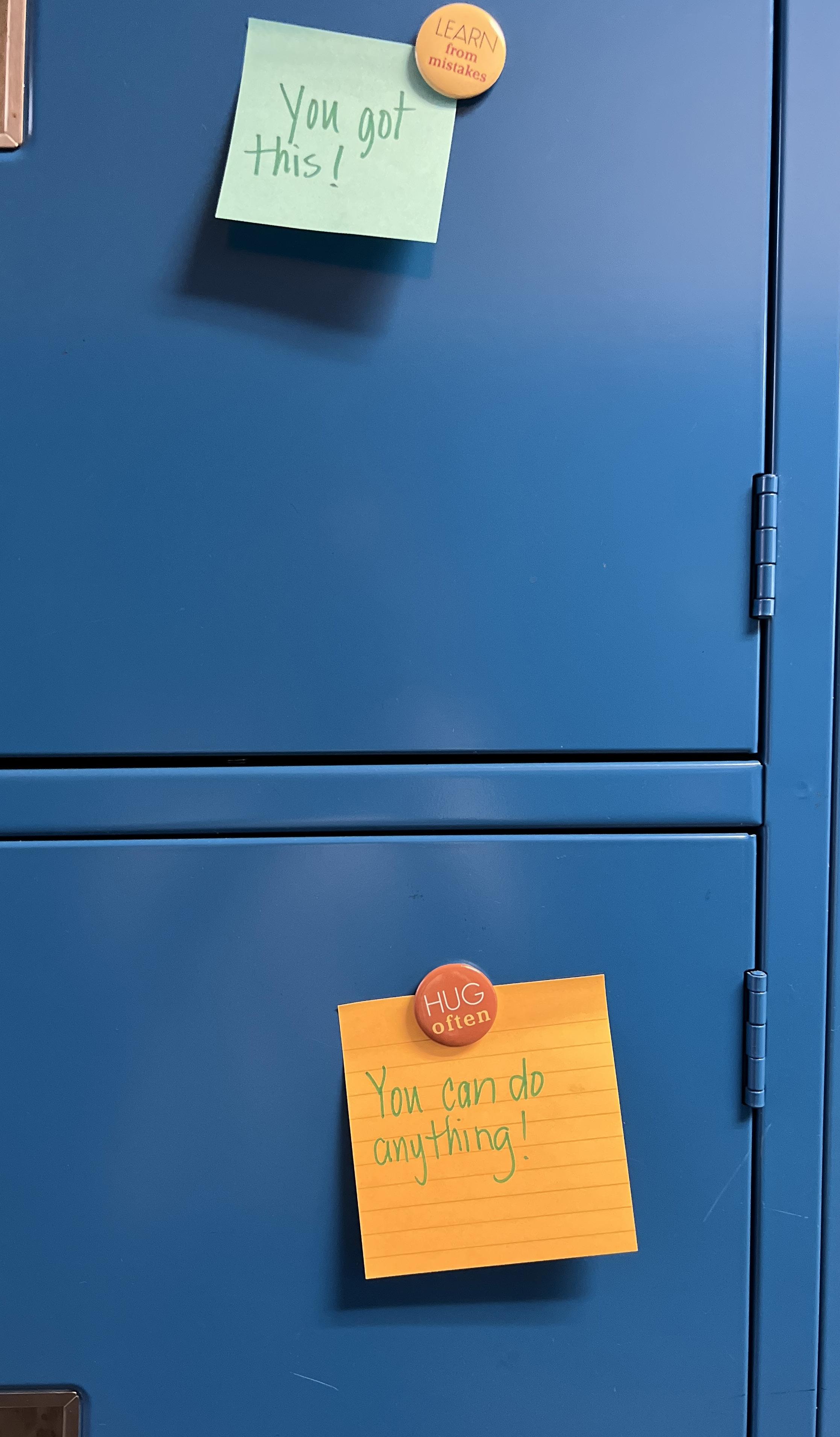
Our Upper School experience EMPOWERS students to take risks through athletic, enrichment, and leadership opportunities and to make a positive impact on the world around them.
Language Arts is embedded at the heart of the Humanities class as students refine their literary skills in preparation for the transition to high school. Students are empowered to use literature as a means of learning more about their world and themselves and to cultivate their own unique voice as a writer. Students learn to write with everincreasing clarity, purpose, and precision, and to further develop critical thinking and articulation skills, learning to share their thoughts, ideas, and opinions, and to reinforce their analysis with evidence.
The program provides a multi-level approach with the opportunity for students to pursue different learning paths. After solidifying and deepening their understanding of foundational math concepts, the focus shifts to algebraic reasoning. For students who are ready to tackle more abstract problemsolving and thrive in a challenging environment, we offer an accelerated path that gives students the opportunity to complete Algebra and progress to Geometry in the 8th grade, allowing them a valuable foot up to pursue more advanced mathematics in high school.
The lens of perspective continues to play an important role in the Upper Grades where Social Studies is integrated with Language Arts in the Humanities block. Students travel through time to make connections, observe historical patterns of civilization and human behavior, and use their knowledge and understanding of the past to better understand the present. Emphasis is placed on critical thinking, civic discourse, and articulation through rich opportunities for discussion and debate.
In Upper School, students engage in hands-on, issue-oriented scientific inquiry in a lab setting. Utilizing the Lab-Aids Issues and Science program developed at the Lawrence Hall of Science, students have the opportunity to engage in scientific investigations within an authentic, real-world context. Students gain a deeper understanding of the world around them while learning scientific principles, vocabulary, and valuable research and note-taking skills. Units of study provide a strong foundation for high school learning and beyond that include chemistry, geological processes, weather and climate, force and motion, energy, cell structure, ecology, body systems, earth’s resources, the solar system, and evolution.

Spanish is formally taught at the Upper School level as part of students core coursework. Class instruction provides an introduction to basic Spanish literacy and speaking skills. Utilizing the Santillana program, students work through vocabulary and grammar concepts to prepare them for entry into Spanish II or Spanish III in high school. Games, projects, and activities are designed to create an engaging learning environment and to differentiate for different levels of experience and mastery.
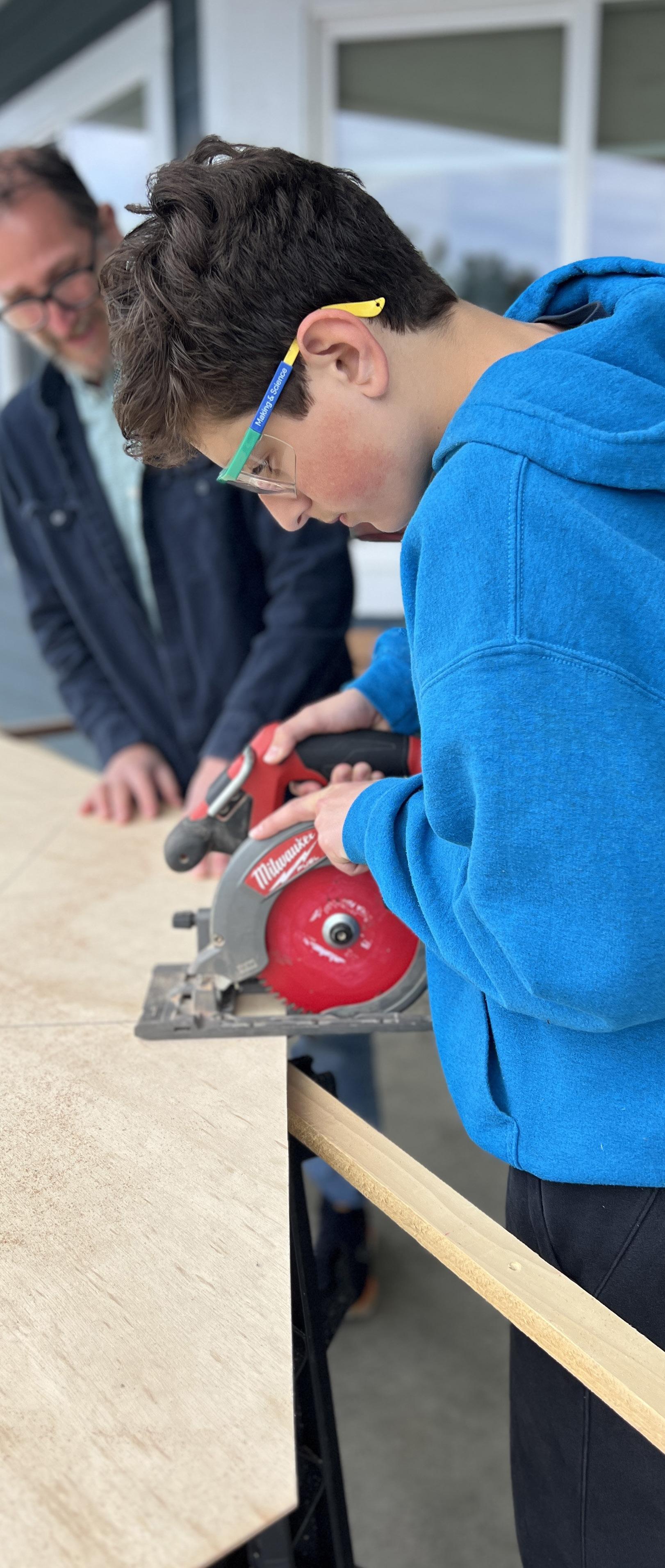
Sea Crest School considers athletics to be an integral part of a wellrounded education. We offer extensive opportunities for studentathletes to develop mind, body, and character while representing their school. Sea Crest Athletics takes pride in having an inclusive environment where all students have the opportunity to participate in a variety of sports. Sea Crest athletes gain confidence with every practice and game, and this confidence carries over to the classroom and their daily lives. Sea Crest athletes are studentathletes, where the student comes first.

In the Upper Grades, students are empowered to have more choice and voice in their enrichment learning. Upper School Exploration classes are designed to offer students the opportunity to further their learning and discover areas of personal affinity in preparation for the transition to high school programs.
All 5th and 6th grade students work in conjunction with the music teacher to select an instrument to play as part of our two-year intro to Band program. In addition, 5th and 6th students participate in introductory Exploration classes over the first semester in Theater Arts, Visual Arts, Technology, and Makers, and select an area of interest to explore further in the second semester.
In the 7th and 8th grades, students select their Exploration courses for both semesters with the opportunity to dig into more advanced concepts. The Advanced Band program creates a space for students to explore different instruments, work as a creative ensemble, select the music and genres they want to play, and perform regularly for community and coastal events. The Theater Arts program collaborates with the SF Opera in the fall where students get the chance to perform alongside professional opera singers. In the second semester, Upper School students have the opportunity to audition for roles in the spring school musical that is performed at the Coastal Rep Theater. Art classes provide a deeper exploration of art forms and genres, including painting, sketching, sculpture, muralism, ceramics, and printmaking with an emphasis on the creative process and self expression. Maker classes offer students increasing skill development with woodworking tools, electronic circuitry, robotics, 3D printing, and engineering, while working on collaborative design projects. In spring, Maker class students also have the opportunity to help design and build the set for the school musical and work as part of the backstage crew. Exploration offerings expand in the 7th & 8th grades to include advanced coding, photography, chess, and leadership.
We believe in empowering our learners to become leaders, act with compassion and lead with courage. Upper School students elect student council representatives each year, providing the opportunity to participate in democratic elections and public service.
The student council represents the collective student voice by acting as a pipeline of communication between students, staff, and administration. They take a leadership role in school events, service initiatives, and spirit day planning.
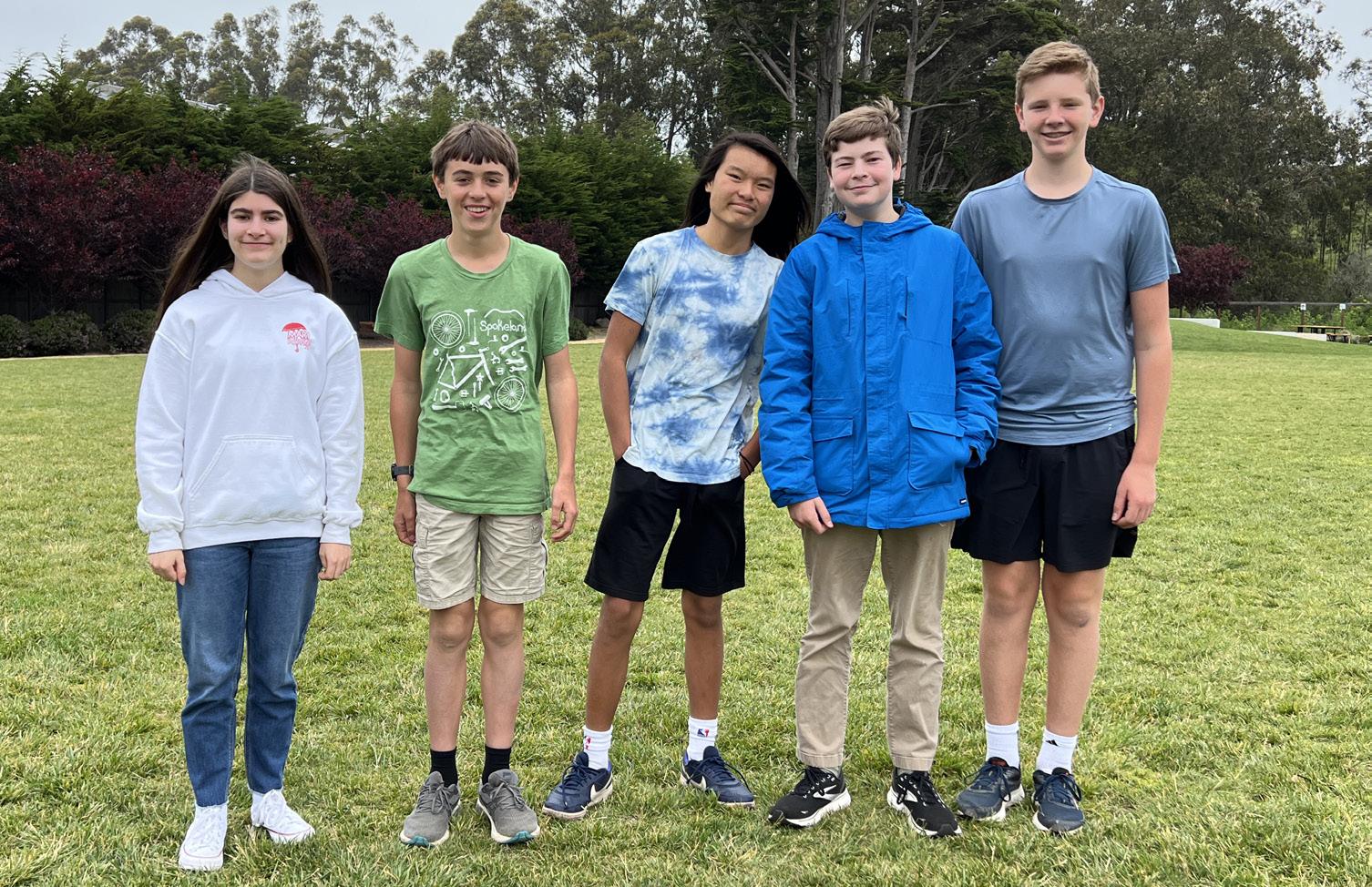
Nona Brozell ’23
Nicholas Naylor ‘24
Leo D’Onofrio ’23
Gabriel Basile ‘24
Tyler Handel ’23
In connection with their science unit on Land, Water, and Human Interactions, fifth- grade students investigate the Pillar Point Harbor to see how our local harbor is used and cared for. They interview people from all walks of life that rely on the harbor for work and recreation, as well as those working to conserve the natural habitats within and around it to educate themselves and others about responsible harbor use.
In sixth-grade English, students hone their persuasive skills to craft an opinion editorial essay on a personal topic of interest. Students then put their powers of persuasion to the test as they present their pieces in a community soap box address event called “Essay-palooza”.
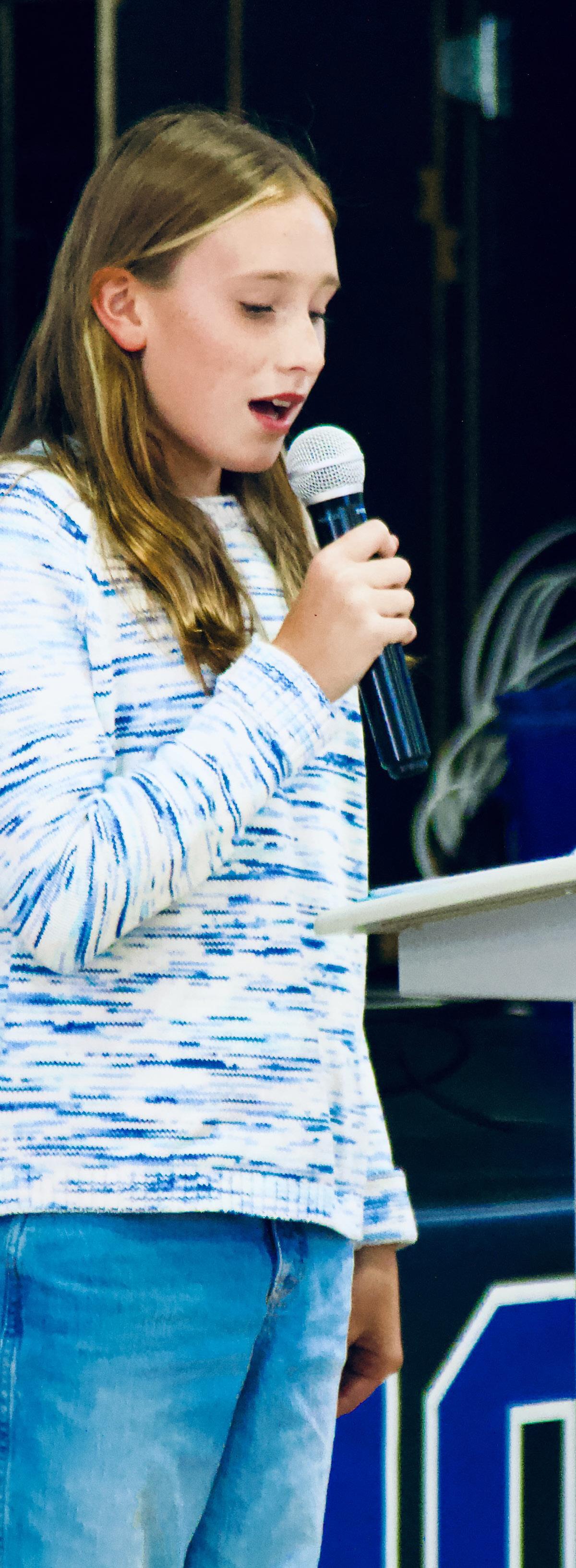
Seventh-grade students develop financial literacy skills in connection with their mathematics learning. They learn key financial literacy concepts, such as budget planning and calculating rates, and put their math skills to practice as part of a financial planning project. Students share insights from their learning with fellow classmates and their families.
Eighth-grade students investigate Civics and the rights and responsibilities of American citizenship. They study the constitution, the three branches of government, and the important role voting plays in a democracy. Students journey to Washington DC in the early spring to see our government in action and culminate this study with a research project on the rights and responsibilities of a democracy.
Fifth Grade
Fifth-grade students examine how the Earth’’s landscape is constantly changing due to natural processes and human activity. They examine the impact that activities like construction, farming, mining, and water control have on weathering, erosion, and water quality. They apply scientific principles to investigate and design systems that can reduce the negative impacts of human activity on land and water.
Sixth Grade
Sixth-grade students investigate the causes and effects of Climate Change. They work to identify key factors that contribute to climate change and research possible solutions to help address the issue.
Seventh Grade
Seventh-grade students investigate biodiversity and how organisms interact within an environment. They examine the question: How do introduced organisms interact with their environments, what are the effects of these interactions, and what can be done to prevent harmful interactions?
Students look at the impact that invasive species have on an environment, how this issue is creating problems for people and affecting biodiversity, and ways we can control or prevent it.

Eighth Grade
Eighth-grade students examine the Earth’s resources and investigate the question: How is a growing human population affecting the availability of natural resources?
Students look at human dependency on resources such as oil, gas, minerals, and fresh water to meet their needs and the impact this dependency has on other species and the planet. Students identify ways that humans can reduce consumption of materials and engage in more sustainable practices.
In the Upper School, students travel each year to a different region of California for an overnight Outdoor Education trip to gain a deeper understanding of the unique diversity and amazing natural environments California has to offer.
In the 5th and 6th grades, students journey one year to Camp Sea Lab on the Seascape coast to learn more about life on and off the northern California coast and to Pfeiffer Big Sur State Park on the central coast to explore the Redwood Forests and learn about natural threats, like wildfires.

In the 7th and 8th grades, students journey to Yosemite National Park in the Sierra Nevada mountains where they explore the unique geology of the Yosemite Valley and the importance of watersheds, as well as Catalina Island off the southern coast with a focus on Marine Science and exploring the kelp forest.
Students also have an opportunity in the Upper School to participate in the school’s annual international trip. Trips rotate each year to a variety of destinations, including Costa Rica, Iceland, the Galapagos Islands, and New Zealand, with a focus on outdoor exploration and environmental stewardship.
Upper School students are also empowered to participate in a wide array of Service Learning opportunities, from working with our senior neighbors and serving at the Table of Plenty program to supporting native plant restoration projects and cleaning our local beaches.
During their 8th grade year, each student selects a service organization of personal interest to research, volunteer at, and advocate for as part of the 8th Grade Capstone Project. Students make presentations about their organization and experience to their families, faculty, and peers in the Spring.
Students continue to explore character traits that connect to the three overarching student outcomes: Be Kind (Social Skills), Be Strong (executive functioning), and Be Well (emotional regulation).

In the Upper School, the emphasis on student Belonging (How can we create a place where everyone feels like they belong?), Well Being (How do I develop personal well-being and how does it affect our relationships with others?), and Engagement (How do we practice engaging meaningfully in our lives, our friendships, and in our school?).
Fifth-Sixth Grades
Be Kind: Belonging
Be Strong: Goal Setting
Be Well: Stress Management
Seventh-Eighth Grade
Be Kind: Leadership
Be Strong: Connecting Values & Your Future
Be Well: Mental Health & Well-Being

Samuel Martin Alvarez
Helen Olivia Campbell
**Jilian Elizabeth Christian
**Sophia Marie Christian
Benjamin Michael Cleary
**Elias Anton Dill
**Mia Rumi Etheridge
**Nora Christine Flynn
**Sydney Noa Franklin
**Jonah Louis Geller
**Anne Ivy Ginna
**Iris Martha Grant
**Kaylani Lynn Guevara
Kaiya Sage Morgan
Hanepen
**Kay Noel Hildebrand
**Lara Keshav
**Alexander Nikos Koron
Kai Fujino Lin
Isabella Murphy
Aidan Christopher
Popple
**Kate Willow Reeve
Carla Marie Roberts
Sophie Marie Slusher
**Tyler Jasmine Standez
**Rachael Leann Taillon
Oran West Terra
Chase William Urban
**Lucas Stephen Velyvis
Hudson Beck Webster
They are attending:
College of San Mateo
Northwestern University
Santa Clara University
Seattle University
Smith College
UC Berkeley
UCLA
UC Santa Barbara
University of Colorado Boulder
University of Portland
Wake Forest University
Worcester Polytechnic Institute
**At Sea Crest since Kindergarten
**Nona Brozell
**Colton Conlon
**Leo D’Onofrio
**Ruby Forchini
Juls Formolo
Logan Garcia
Oliver Gestwicki
**Tyler Handel
**Finley Horner
**Liam Isley
Allie Marshall
Miles Meyer
**Elliot Oliver
Derek Rose
Cullen Simmons
Djuna Wicks
**Madeleine Willits
They are attending:
Half Moon Bay High School
International Sharing School (Portugal)
Lick Wilmerding
Mercy High School
Burlingame
Notre Dame Belmont
Pinewood School
Serra High School
**At Sea Crest since Kindergarten
Congratulations! You are joining an amazing group of over 530 talented and successful Sea Crest alumni who are making waves nation-wide and around the world.
No matter how far you go or what the future has in store for you, the ties that connect you with the Sea Crest Class of 2023 will exist forever.

We will miss seeing you on campus and hope that you stop by to visit occasionally.
Please stay in touch and update your information: seacrestschool.org/alumni
We will always be here for you.
The best part is coming to a place where you have good childhood memories and getting to watch kids make those memories now.



I like the full circle moment of seeing the young kids playing where I used to play everyday and being an influence in their lives now.
My favorite thing is enjoying and embracing the nostalgia of it all, and also seeing the new things that have changed and seeing the school expand.

My
These amazing alumni are spending summer with us and making waves as summer camp staffers.


I had a wonderful experience working with the children and giving back to the school that holds a special place in my heart and my family’s. The children come to school with joy in their hearts and appreciate everything we do for them.
 ~Rose Geller
Mercy High School
UC Davis
~Rose Geller
Mercy High School
UC Davis
favorite thing about working at Sea Crest camp is being able to come back to see how things have changed for the better.~Gabe
Giacotto‘16 Serra High School ‘20 Gonzaga University
Over the course of the past year, the strategic planning committee has partnered with Leadership and Design, a non-profit based in Los Gatos, CA, to create Sea Crest School’s next strategic plan. Our goal is to build a strong sense of our school’s future direction- a “compass” backed by a set of priorities and initiatives to work toward grounded in our mission, core values, history, vision and culture.


Our Strategic Planning Committee is composed of trustees, teachers, administrators, alumni and parents within our school community.
Greg Gladman
(Parent of Sofia ‘22 and Evelyn ’27)
Peter Colabuono
(Parent of Gabriel ‘29)
We have reached the halfway point of our journey.
In the first quarter, we were in the DISCOVER phase where the committee focused on:
• Team Building, understanding the school anthropology, context mapping, question storming and interview training
• Interviews across all constituents were conducted
• Parent and Faculty/Staff Think Tanks held
• Unpacking of data
• Development of Inquiry Groups
We entered into the second quarter during the DEFINE phase where the committee focused on:
• A focus on strategic forces operating beyond the school walls
• Team-led competitive analysis
• The creation of a context map, or a hands-on exercise in futurist thinking to understand the possible futures for which the school may need to prepare
• Narrowed down a well-defined set of four inquiry areas
What’s
Greg Bamford is a CoFounder and Senior Partner at Leadership+Design. Prior to leading L+D, Greg was Associate Head of School for Strategy and Innovation at Charles Wright Academy in Tacoma, Washington, and Head of School at the innovative Watershed School in Boulder, Colorado. He is a co-founder of the Traverse Conference, a national conference on experiential and place-based learning, and is on the Board of Trustees at his alma mater, The Overlake School in Redmond, Washington.
With his experience in school leadership, Greg brings a strategic lens to leadership development, innovation, and change management for Leadership+Design clients. He has led strategic planning for a variety of independent and public schools nationally. Greg also has been a featured speaker at dozens of education conferences, has consulted with a wide range of schools nationally, and has written for industry publications like Independent School, Net Assets, and The Yield. Greg lives in Tacoma, Washington with his wife and two children. Today

Saturday, September 23rd, 2023 from 9-3pmCommunity Day & Reception


• First drafts of Strategic Plan due in late 2023
• Final proposed Strategic Plan due January 2024

Graciela Krabbenschmidt
Barbara Laughlin
Beverly Laurenzano and Nick De
La Torre
Karen Llewellyn
Aimee Llewellyn and Pastor
Chavez
April Loui
Robert MacDonnell
Michelle Martin
Denise Martocchio
Lynn Medoff
Cheryl Milner
Karl Mingus
Neda Moshasha and HMB
Optometry Family Eye Care
Vitaly and Maria Mozeson
Nancy Nerhan
Andy Ng
Barb Nielsen
Judith O’Donnell
Sharon O’Connor
Kevin O’Grady
Oscar Ollarzaba and Ana Rico
Daniel and Melody Orlicky
David and Alejandra Ortega
Leslie Pearlson
Norma Perez
Jeff and Deborah Pierce
Barbara Pierce
John and Cheryl Popple
Dylan and Harriet Ragozin
Robert Re
Molly Rice and Scott Meyer
Halley Riley
Anthony Roberts
Phillip and Jacqueline Rogers
Dani Ronen
Joshua Schwarzapel and Jessica
Ansari
Joe Sexton
David Sexton
Marie Smith and Daniel Marquess
Pamela Smith Kimura
Alexandra and Hunter Smithmixter
John Steadman and Maxine
Engdahl
Yuanyuan Su
Eric Swanson
Donnette Taboada
Sergio and Siobhan Togliatti
Victoria Van Zanten and Ron
Blandford
John and Susan Vandemoer
Nicholas and Sue Vandemoer
Catherine and Keith Vendola
Joyce Wachsmuth
Christine Waldrop
Margaret Washington
Nicklos and Frances White
Lucy and Robert Wicks
Sharon Wolff
Anonymous (8)
Lauren Anderson
Adam Andrew
Alicia Antuna
Mary Arnold
Jordi Artal
Roser Artal
Emily Artz
Adam Bacchus
Ginger Bagai
Patricia Bailey
Cathi Bailey
Sarah Baker
Senior Basketball Team
Christine Beffa
Courtney Blaskower
Debbie Booth
Linda Bortolotti
Donna Breedlove
Courtney Brown
Richard and Cheryl Burns
Alex and Angela Buttler
Jerry and Elise Cabilatazan
Jorden Castagna
Tim and Debra Christian
Trisha Colton
Lindsay Cunha
Regan Daniels and John
Qaqundah
Bridgitte Deacon
John Dickey
Ruth Dunn
Rachel Dunnigan
Judy Easter
Melissa Feague
Merlinda Felix
Heidi Fischer
Marie Frazer
Lee Freeman
Christine Geis
Rena Gooding
Anne Grant
Karen Greenhaw
Michael Haase-Whitaker
Michelle Haley
Stephanie Hanepen
Greg Harris
Kristine Harris
John and Analise Heid
Amanda Hill
Dorothy Hoban
Alana Hoey
Stephen Holzer
Jessica Huber
Christine Jones
Kristy Jordan
Nicole Jung-Alexander
Camden and Sean Junge
Alexandra Kaneb
Kristine Koepke
Ellen Kruger
Susan Kruger and Alex Nedzel
Valerie Kuntz
Suzanne Leichman
Jacqueline Machado
Lauren Madrigal
Lisa Martin-Baker
Mitchell McKinnon
Lori McMillan
Deborah Mendes
Jennifer Mitchell
Heather Mosby
David Mullins
Ami Ng
Mike and Julie Orlicky
Michael Orlicky
Lissett Ortega
Jeffrey Patovisti
Peggy Pearlson
Ramona Perez
Gerald Pham
Jennifer Pickart
Brian Pierce
Morgan and Michael Pierce
Roberta Pimentel
Susan Putnam
James Riley
Judy byrne Riley
Meghan Riley Bowling
Liza Roesch
Rose Ronquillo
Robin Rose
Mathuram Santosham
Angela Schuman
Teresa Schuman
MariaElena Simpson
Mark Skinkle
Rhonda Skinkle
Sarah Smith
Denise Spusta
Leila Stadler
Diane Stadmeyer
Tyson Stagner
Marion Taylor
Matthew Telleria
Martin Telleria
Moises Telleria
Sarah Tennyson
John Tennyson
Cynthia Theyel
Lisa Tolli
Andrew Townsend
Larry Trexler
Sulema and Jose Villalobos
Donna Vreeland
Jenn Wang
Allison Washington
Toni Wells
Jen Wicker
Regina Wiegand
Anonymous (3)
*Gifts matched by a corporation
SpeciAl
ANNUAL FUND CLASS AGENTS
Kelly DiTrapani
Amanda Evans
Tiffany Garcia
Greg Gladman
Paige Kaneb
Andrea Lessani-Willits
Petra Patton
Dawn Spusta
Lucy Wicks
BOARD OF TRUSTEES
Executive Committee
Karin Manuele, Chair
Regan Daniels, Vice Chair
David Nedzel, Treasurer
Robyn Dunlap, Secretary
Lauren Miller, Head of School/ Ex-Officio
Jim Bartel, Trustee Emeritus
Tanya Gulesserian, Trustee Emerita
Pam Izzo, Trustee Emerita
Members
Maria Burns
Peter Colabuono
Kerri Conlon
Jessica Favreau
Greg Gladman
Keith Holden
Graciela Krabbenschmidt
James McGrath
Steve Patton
Jackie Rogers
DEVELOPMENT COMMITTEE
Maria Burns, Co-Chair
Kerri Conlon, Co-Chair
Kelly DiTrapani
Robyn Dunlap
Gabriel Esposto
Bridget Jett
Graciela Krabbenschmidt
Karin Manuele
Lauren Miller
David Nedzel
Ambar Pina
PAB EXECUTIVE COMMITTEE
Kristina Keates, Co-President
Emily Murtha, Co-President
Jackie Zarker, Treasurer
Camden Junge, Teacher
Appreciation Chair
Karen Wang, Room Parent Coordinator
Lori Newkirk, Volunteer Coordinator
Nichole Sherebernikoff, Volunteer Coordinator
Rhonda Figone, Booster
Lauren Rossman, Booster
Molly Vandemoer, DEB Liaison
Sarah Hamirani, DEB Liaison
Matt Jones, Dad’s Club
IN-KIND DONATIONS
Esposto’s Catering
James McGrath
Larratt Brothers Plumbing
SEAL LEAGUE SPONSORS
Bianchi Flowers
Goldworks Jewelry
HMB Family Dentistry
HMB Optometry Family Eye Care
Jakki Harlan Real Estate
JJ’s Storage
Plunjr
Primark Benefits
Pure Skin Therapy
Stephanie Sills Real Estate
STUDENT COUNCIL
Leo D’Onofrio ’23, President
Gabriel Basile ‘24, Vice President
Nona Brozell ’23, Secretary
Nicholas Naylor ‘24, Treasurer
Tyler Handel ’23, Leadership
2022-23 Student Council
Nona Brozell ’23
Nicholas Naylor ‘24
Leo D’Onofrio ’23
Gabriel Basile ‘24
Tyler Handel ’23
Gifts may be delivered to the Development Office at Sea Crest School, 901 Arnold Way, Half Moon Bay, CA 94019.

(One-time or Monthly Donations)
Sea Crest accepts online gifts. The process is quick, easy and secure.
Giving a gift of appreciated stocks, bonds, or mutual funds can be to your financial advantage. In most cases you may claim a charitable-income tax deduction for the full fairmarket value on the shares and avoid capital gains tax. Please consult your financial advisor to clarify the advantages.
seacrestschool.org/give
Many employers offer programs that will match or multiply an employee’s gift to Sea Crest. Does your employer have a matching gift program? Double your impact through matching funds. Check with your company’s Matching Gift Coordinator (usually in the Human Resources or Community Relations Department) for more information.
Our school has two major fundraising events every year: the auction and the Ginger Girvin run for flexible tuition. These events show your support for the school and the great work we do while providing financial stability. These fundraisers also offer many ways for parents to get involved and connect.
If you are in a position to make a large donation, contact development@seacrestschool.org to discuss the direction of your gift and potential naming opportunities.
Planned gifts put your assets to work now and into the future. Contact development@seacrestschool.org to discuss bequests, charitable trusts and other legacy gifts.
Please contact Director of Advancement, Ambar Pina, at 650.712.9892 x239, or via email at development@seacrestschool.org.
Our lists reflect gifts received between July 1st, 2022 and June 30th, 2023.

FAmily SpAghetti dinneR
Friday, September 8th, 2023
BAck to School night/lAunch oF AnnuAl Fund*
Thursday, September 14th, 2023
StRAtegic pl An community dAy
Saturday, September 23rd, 2023
WinteR conceRt/gRAndpARentS/SpeciAl FRiendS dAy
Thursday, December 21st, 2023
the dReAm event*
Friday, March 15th, 2024
gingeR giRvin Run*
Friday, May 3rd, 2024
muSicAl
Tuesday, May 20th-Friday, May 24th, 2024
8th gRAde gRAduAtion
Friday, June 7th, 2024
lASt dAy oF School/end oF the yeAR cARnivAl
Wednesday, June 12th, 2024
*Fundraising Event
Sea Crest has made every effort to check the accuracy of the lists in this report. We sincerely regret any errors or omissions and request that you report them to development@seacrestschool.org so that we may correct our database. Sea Crest appreciates your support and values each contribution.
Annual Report Contributors:
Jacquie Cuvelier, Chief Financial Officer
Michelle Giacotto, Director of Curriculum
Lauren Miller, Head of School
Ambar Pina, Director of Advancement
Sea Crest School

901 Arnold Way
Half Moon Bay, CA 94019
650.712.9892
seacrestschool.org
